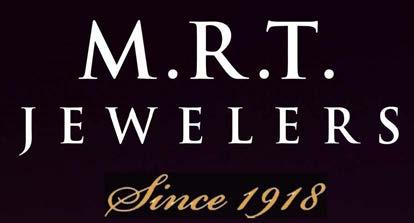
















EDITOR Fran Ostendorf
DESIGN & LAYOUT Alex Foster
ADVERTISING DEPARTMENT
Peter Zeldin | 401-421-4111, ext. 160 pzeldin@jewishallianceri.org
CONTRIBUTORS Bob Abelman, Ruth Marris Macaulay, Sarah Greenleaf, Robert Isenberg, Emma Newbery
COLUMNISTS Michael Fink, George M. Goodwin, Patricia Raskin, Rabbi James Rosenberg, Daniel Stieglitz
VOLUME XXXII, ISSUE III
JEWISH RHODE ISLAND (ISSN number 1539-2104, USPS #465-710) is published monthly except twice in May, August and September.
PERIODICALS POSTAGE PAID at Providence, R.I
POSTMASTER Send address changes to: Jewish Rhode Island, 401 Elmgrove Ave., Providence, RI 02906.
PUBLISHER
The Jewish Alliance of Greater Rhode Island, President/CEO Adam Greenman, Chair Harris Chorney, 401 Elmgrove Ave., Providence, RI 02906. 401-421-4111; Fax 401-331-7961

MEMBER of the Rhode Island Press Association.
COPY DEADLINES: All news releases, photographs, etc., must be received on the Wednesday 10 days prior to publication. Submissions may be sent to: editor@jewishallianceri.org.
ADVERTISING: We do not accept advertisements for pork or shellfish. We do not attest to the kashrut of any product or the legitimacy of advertisers’ claims.
ON THE COVER : Plant starts.
WELCOME TO MARCH! We made it through February with its cold, snowy and gray days.
We’ve made it to the Hebrew month of Adar, the month where we increase our joy. You are practically commanded to be happier.
We all need a little more happiness right now. It seems harder than usual to up the happiness quotient. The world feels pretty chaotic. From bird flu to politics, there is a lot to cause anxiety.
News from our nation’s capital is coming fast and furious. Programs are being slashed, and tariffs have been deployed. How will this impact our lives? Meanwhile, Republicans and Democrats are having a tough time figuring out how to govern together. Friendships, business relationships and families are being torn apart by an increasingly polarized and unforgiving view of politics.
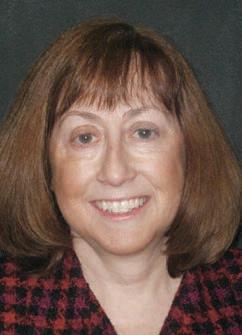
In Israel there is still concern about the remaining hostages and what will happen next with the ceasefire. What’s the future of Gaza and the West Bank? What will happen to the government? How will the conflicts ever be settled?
Here in Rhode Island, we’re wondering when the Washington Bridge will ever be rebuilt and what went so horribly wrong with the old one.
These are not easy times. We can still find happiness by focusing on the good things all around us and not anguish too much about what we can’t control. But how will you get to that happy place? Family? Travel? Household projects? Your career? Volunteering in your community? All of the above? Any activity like this will increase your joy and happiness.
One thing I am looking forward to is celebrating Purim. While the annual parade on the East Side is no longer, there are plenty of places to go to listen to the megillah and watch your friends and neighbors perform in a creative spiel. We even have some creative hamantaschen recipes that you might want to try (see page 8 – 9). Seeing the little ones dressed in costume always brings a smile to my face. And spring is around the corner. Warmer weather. Flowers. Buds on the trees. Outdoor activities. More daylight for those walks in the park.
I feel happier already!
Fran Ostendorf, Editor

BY JEWISH RHODE ISLAND STAFF
DO YOU KNOW someone in the Jewish community who deserves recognition for doing good work?
The Jewish Alliance of Greater Rhode Island is now taking nominations for its annual community leadership awards. These awards are designed to recognize community volunteers who have demonstrated significant leadership and service to the Alliance, to the Jewish community and to the Rhode Island community at large.
The three awards are: Joseph W. Ress Community Service Award, Riesman Leadership Development Award and Norman D. & Flo Tilles Community Relations Council Award.
Nominations are due by March 19. Awards are presented during the Alliance’s annual meeting in June. For more information including nominating forms and guidelines, contact Gail Putnam, chief administrative officer, at gputnam@jewishallianceri.org.


to the diverse views of the Jewish community in Rhode Island and Southeastern Massachusetts, while adhering to Jewish values and the professional standards of journalism. ALL SUBMITTED CONTENT becomes the property of Jewish Rhode Island. Announcements and opinions contained in these pages are published as a service to the community and
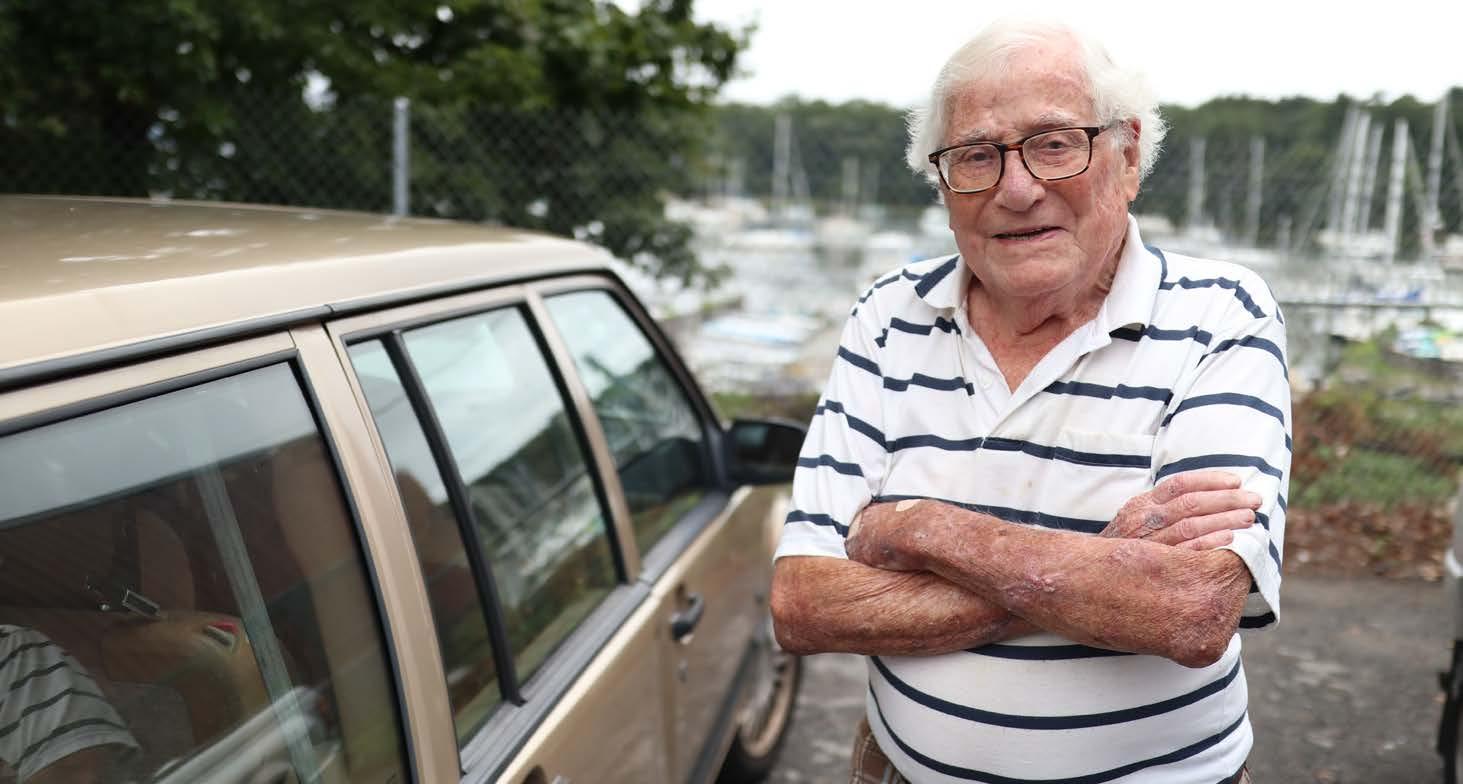
Dick Shapiro delivered Jewish Rhode Island – and many other Rhode Island publications – for more years than anyone now working at the paper remembers. He passed away Feb. 27 just shy of his 95th birthday. We thought it was the right time to rerun a story we did on him in 2022.
BY ROBERT ISENBERG
Dick Shapiro doesn’t have a smartphone. He doesn’t have a computer, which makes his desk look strangely empty. His company, East Greenwich-based Special Delivery, distributes periodicals across Rhode Island, but it has neither a website nor a social media presence.
SHAPIRO RUNS MOST of his business through a landline, using a telephone shaped like Mickey Mouse.
Above all, Shapiro dislikes email.
“In my mind, email is giving somebody a readymade excuse to tell you, ‘Oh, gee, I didn’t get your email, or I would’ve done what you asked me to do,’ ” says
Shapiro. “You gave them the excuse to lie to you.”
Shapiro is 92 years old, and he has a special relationship with Jewish Rhode Island: His company has delivered the newspaper for the past 10 years. When you see issues of Jewish Rhode Island stacked up at a supermarket or coffee shop, Shapiro is likely the man who deposited
them.
On delivery days, Shapiro fills his trunk with bundles of Providence Monthly, Truck and Equipment Post and, yes, Jewish Rhode Island. He contracts with other drivers for some distribution, but he also personally navigates the state in his 27-year-old Volvo station wagon, ping-ponging from one vestibule to another.
“I like doing it!” Shapiro proclaims. “Like any business, you will run into problems. And not all problems can be solved – boom! – just like that. But when you fill up your station wagon full of these magazines, and it’s right up to the roof, and five or six hours later, it’s empty because you delivered it all, there’s a sense of accomplishment.”
Not surprisingly, Shapiro had a paper route when he was 12. He grew up in Mount Vernon, New York, where he delivered the Mount Vernon
Daily Argus. His father and uncle also worked for distribution companies.
Shapiro’s first real job was checking the newsstand stock in New York City subway stations.
He went on to drop out of college and work a number of different jobs.
Sometime in the 1970s – he can’t remember exactly what year – Shapiro was invited to interview for a circulation manager position at the National Enquirer, the weekly tabloid based in New York City.
But Shapiro didn’t care for the Enquirer, and he bluntly said so.
“I just told them what I really thought and criticized much of what they were doing,” he recalled.
To his surprise, the Enquirer offered him the job, even after he asked for a salary that was twice what he’d ever earned.
“They said, ‘Fine, you start
tomorrow morning.’ They were looking for someone who wanted to do things differently.”
During the one year he worked for the Enquirer, Shapiro says he increased circulation from 1 million copies a week to 2 million. The numbers might have continued to climb, but Shapiro says the company made a “morally unacceptable” demand, and he quit.
“I had come to realize that I was going to have to turn into the kind of person I don’t wish to be, and the money was unimportant,” he says, though he declined to explain what the demand was.
Morals and ethics have guided many of Shapiro’s decisions over the decades. He rattles off the names of many different employers, including Pines Publications, Simon & Schuster, the record label Golden Records and
Afew weeks ago, I got some really exciting professional news: a project that I’ve been working on at Clal – The National Jewish Center for Learning and Leadership – for the past year received significant funding, which meant we could scale it far beyond our initial scope. Countless hours of research, thought leadership and networking had finally paid off. As soon as I finished reading the email, I swiped over to my text messages and shared the news with my brother and sister in a group chat that we’ve kept going for many years.
THE GIFS, emojis and exclamation points came pouring in immediately; they couldn’t have been happier for their baby brother, and they celebrated my good news like it was their own. I’m not usually one to shout my victories from the rooftop or share them on social media, so having a channel like this, with two people whose opinions I hold dear, felt particularly sacred. It’s worth noting, though, that it wasn’t always like this between us. There were plenty of tears shed, names called, stuffed animals desecrated and bones broken along the way (mostly mine, for the record), but at some point we figured it out. I can’t pinpoint a date, or even a year, when the transition happened, but whenever it did, it changed all of our lives. It’s precisely that shift – from sibling rivalry to sibling revelry – that is worthy of a deeper exploration here.
for the Israelites. Through the establishment of Priesthood, this budding nation now goes from having one model of leadership in their midst – Moses the Prophet – to two. And who, of all people, takes on the helm of this emerging leadership?
None other than Moses’ big brother, Aaron.
Not only is Moses’ name left out of the parsha, but God instructs him to convey the leadership directions to his brother.
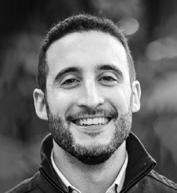
“And you shall draw your brother Aaron and his sons close to you to serve Me as priests,” (Exodus 28:1); “And you shall…ask the skilled craftsmen to make Aaron’s vestments,” (Exodus 28:3). What must that have felt like to Moses, who until that point had been the sole leader of the Israelites? At the very least, he might have experienced it as a demotion, but at the worst an indictment of his character. And – I can’t stress this enough – this was his big brother we’re talking about!
In this week’s parsha, Tetzaveh, God gives a series of detailed instructions to Moses about installing a new model of leadership into the Israelite community: Priesthood. Moses receives guidance on everything from the sartorial requirements of the priests – a linen tunic here, a bejeweled breastplate there, to the sacrificial choreography that they would soon execute – a sprinkle of blood on this altar, a consecrated bull on that one. But perhaps the most interesting thing about this entire parsha detailing the instructions given to Moses, is that Moses’ name doesn’t appear even once!
This fact, of course, is more than simply a coincidence; it marks an important leadership transition
in God of his anxiety to meet his older brother, is calmed when God reassures him that “he will be happy to see you,” (Exodus 4:14). As promised, when Aaron finally lays eyes on his baby brother, “(Aaron) went and met him at the mountain of God, and kissed him,” (Exodus 4:27). Shemot Rabbah, a midrashic commentary on the book of Exodus, we learn the following interpretation: “And he kissed him” – This means: each rejoiced at the other’s greatness,” (Shemot Rabbah 5:10).
What could have been an ugly confrontation fueled by jealousy or animosity (lest we forget that Moses, the younger brother, was selected to be the Israelite leader), or at least an awkward reunion, turns into a tender, intimate moment. They stay in that embrace for some time, with Moses soon regaling his brother with stories about his interactions with God and sharing the burden of God’s instructions with his big brother.
But instead of representing the eventual deterioration of their brotherly love, this moment actually drives them closer than ever before. For the first time in Torah, we see two brothers with every reason to resent each other, with every opportunity to undermine or hurt the other, who learn to live and lead alongside each other, in harmony. What Cain and Abel, Isaac and Ishmael, Jacob and Esau, Joseph and all of his brothers, could never accomplish, Moses and Aaron do. The question then, is mah nishtanah –what makes these brothers different from all others?
In chapter 4 of the book of Shemot – Exodus – we witness the moment in which Moses and Aaron first meet. Moses, confiding
Moses and Aaron”. They were so beholden to one another that their actions, their very beings, were attributed one to the other. They were one.
The result of their bound brotherhood is that no matter the circumstances, they become each other’s strongest supporters. In Midrash Tanchuma, Rabbi Shimon Bar Yochai (Rashbi) states: “The heart that was happy for his brother’s important role, will ultimately be happy in his own role.”
Building on this, the aforementioned Shemot Rabbah lays out a sort of division of labor between the brothers: “Loving-kindness – this refers to Aaron. Truth – this refers to Moses. Righteousness – this refers to Moses. Peace –this refers to Aaron,” (Shemot Rabbah 5:10). Alone,

We know now that their initial connection was a healthy one; they started off on the right foot. But the bigger question remains: why didn’t the relationship eventually devolve into bitter rivalry?
Chief Lord Rabbi Jonathan Sacks z”l picks up on some strange phrasing in a brief passage about Moses and Aaron interacting with Pharaoh. In chapter 6, two notable phrases emerge: the first is that Moses’ and Aaron’s names are interchanged several times. In verse 20, the text reads “Aaron and Moses.” But later, in verse 27, it reads “Moses and Aaron.” Just as Torah doesn’t elevate one brother over the other, Aaron and Moses learned to never elevate themselves over the other, either. Second, the text refers to them both in the third person singular – “He was Aaron and Moses”, “He was
neither Moses nor Aaron has what it takes to lead the Israelites into nationhood. But with their gifts combined, the Israelites will have all the leadership they need to move into the Promised Land united as one, just like the two brothers who brought them there.
RABBI ELAN BABCHUCK is proud to serve as the Executive Vice President of Clal - The National Jewish Center for Learning and Leadership and is the Founding Director of Glean Network. He is the author of – most recently – “Picking Up the Pieces: Leadership After Empire.” He lives in Providence with his wife and three kids and packs a day bag any time he leaves its borders.
March 7 5:23pm March 8 Daylight Savings
March 14 6:31pm March 21 6:39pm March 28 6:47pm

FOR COMPLETE MONTHLY LISTINGS, VISIT JEWISHRHODY.ORG
Ongoing
Kosher Senior Café and Programming. 11 a.m.-1 p.m.
Monday – Thursday at the Bonnie & Donald Dwares JCC, 401 Elmgrove Ave., Providence; Fridays at Temple Sinai, 30 Hagen Ave., Cranston. In-person (and on Zoom Tuesdays, Wednesdays and Thursdays) programming from 11 a.m.-noon followed by lunch and discussion noon-1 p.m. On Wednesdays, programming is chair yoga. For seniors aged 60 and older as well as younger adults with a disability. Suggested donation: $3 per lunch. The Kosher Senior Café is a program of Jewish Collaborative Services, supported by the Jewish Alliance of Greater RI and Blackstone Health. Information and RSVP, Neal or Elaine at neal@jfsri. org or 401-421-4111, ext. 107.
Hebrew Classes Winter Session at Temple Emanu-El. Tuesdays 5-5:45 p.m. beginner 1 class. All other levels 6-7 p.m. thru 3/11. 99 Taft Ave., Providence. Five levels of in-person Hebrew conversation classes: beginner 1, beginner 2 (ongoing class – not open to new students), intermediate 1 and 2, advanced and Hebrew Games. Information, Toby Liebowitz at tobyaane@gmail.com.
Delve Deeper: “Messianic Hope and Longing in Jewish Thought.” Wednesdays 7-9 p.m. thru 4/9. Focusing on the divergence with Christianity, the disappointed expectation of Sabbatai Zvi, the rise of Hasidism, interpretations of Jewish Statehood as supernal redemption and the influence of Chabad philosophy on contemporary American Jewry, explore with Paul E. Nahme how Jews have made sense of exile and suffering, hope and longing. Information, Morty Miller at mortymiller1945@gmail.com.
Teen Nights at Temple Beth-El. Thursdays 6 p.m. 70 Orchard Ave., Providence. Dinner and discussion. No Teen Night on 3/13. Information, Jillian Brosofsky at jbrosofsky@ temple-beth-el.org or 401-3316070, ext. 100.
Cape Cod Synagogue Family Shabbat Services and Dinner. Second Friday of the month 5:30 p.m. 145 Winter St., Hyannis, Mass. In-person and livestreamed services on website, Facebook, Cape Media, YouTube and Community Television Comcast channel 99. Followed by Community Shabbat dinner. Information, 508775-2988 or capecodsynagogue. org.
Cape Cod Synagogue Shabbat Services. Fridays 7 p.m. 145 Winter St., Hyannis, Mass. With Rabbi David Freelund. In-person
and livestreamed on website, Facebook, Cape Media, YouTube and Community Television Comcast channel 99. Information, 508-7752988 or capecodsynagogue.org.
Temple Beth-El Torah Study. Most Saturdays 9 a.m. 70 Orchard Ave., Providence. Join Temple Beth-El clergy and delve into the weekly portion. Torah Study is in person only. No Torah Study on 3/22. Information, Jillian Brosofsky at jbrosofsky@temple-beth-el.org or 401-331-6070.
Temple Sinai Breakfast and Torah Study. Saturdays 9:30-11 a.m. 30 Hagen Ave., Cranston. Breakfast followed by the weekly Torah study at 10 a.m. Information, Templesinairi.org, dottie@ templesinairi.org or 401-942-8350.
Temple Habonim Torah Study. Most Saturdays 10-11 a.m. Rabbi Howard Voss-Altman leads Torah study on current portion. Via Zoom. Information, Adina Davies at office@ templehabonim.org or 401-2456536.
Cape Cod Synagogue Shabbat Services. Saturdays 10:30 a.m. 145 Winter St., Hyannis, Mass. With Rabbi David Freelund. In-person and livestreamed on website, Facebook and YouTube. Information, Cape Cod Synagogue at 508-7752988 or capecodsynagogue.org.
Temple Sinai Shabbat Morning Service. 11 a.m. 30 Hagen Ave., Cranston. Most Saturday mornings, services are held from 11 to noon in the chapel. On mornings when celebrating a Bar or Bat Mitzvah, services also begin at 11 and are held in the sanctuary. Information, Templesinairi.org, dottie@ templesinairi.org or 401-942-8350.
Friday | March 7
Temple Beth-El Shabbat B’Yachad Service and Dinner. 5:45 p.m. 70 Orchard Ave., Providence. Join us for Shabbat Services led by students with a special D’vrei Torah from the teens who visited the Religious Action Center in Washington, D.C. Open to all. RSVP for dinner at temple-beth-el.org. Information, Jillian Brosofsky at jbrosofsky@temple-beth-el.org or 401-331-6070, ext. 100.
Temple Habonim Tot & Family Shabbat. 5:45 p.m. 165 New Meadow Road, Barrington. Tot Shabbat 5:45-6:15 p.m. followed by pizza dinner at 6:15 p.m. and family service at 6:45 p.m. RSVP (for dinner) or information, office@ templehabonim.org.
Temple Torat Yisrael Virtual Kabbalat Shabbat and Torah Services. 5:45-6:15 p.m. Via Zoom only. Information, temple@ toratyisrael.org.
Temple Sinai Shabbat. 6-7 p.m. 30 Hagen Ave., Cranston. Guest speaker Padma Venkatraman with the RI Authors Against Book Bans. Information, Templesinairi.org, dottie@templesinairi.org or 401942-8350.
Saturday | March 8
Temple Torat Yisrael Saturday Morning Shabbat Services. 9:30-10:30 a.m. 1251 Middle Road, East Greenwich. Join in person or via Zoom. Information, Temple@ toratyisrael.org.
Kids’ Night Out: Wild West. 5-9 p.m. Bonnie & Donald Dwares JCC, 401 Elmgrove Ave., Providence. Kids have fun while parents have the night off. Activities include gym games/sports, art, board games, free play and a movie. Dinner and popcorn included. Cost: JCC member $40 | non-member $55 | additional siblings $25. Information, Rachel Accetturo at raccetturo@ jewishallianceri.org or 401-4111, ext. 140.
Temple Beth-El Bring and Sing Havdalah. 5:45 p.m. 70 Orchard Ave., Providence. Join Rabbi Neimeiser for a musical experience and vegetarian potluck. Bring a song, a story, a poem that moved you, an open heart and a vegetarian dish/snack. Open to all. Information, Jillian Brosofsky at jbrosofsky@ temple-beth-el.org or 401-3316070, ext. 100.
Sunday | March 9
Temple Emanu-El Purim Quest Carnival. 10 a.m.-12:15 p.m. 99 Taft Ave., Providence. Annual Purim carnival. Open to 0-5 year olds 10-11 a.m. and everyone else 11:15 a.m.-12:15 p.m. Cost: $10 in advance | $12 at the door. Information, Rachel Cohn rcohn@teprov.org 401-331-1616.
Temple Beth David Purim Carnival. 10 a.m.-1 p.m. Narragansett Community Center, 53 Mumford Road, Narragansett. Food, games, music and prizes at the annual Purim carnival. Dress as your favorite character from the Purim story. We will read the Megillah together. Information, Brenda Levin at schs.gansett@ gmail.com.
Temple Emanu-El Pizza Lunch and Purim Sesame Spiel. 12:15-2 p.m. 99 Taft Ave., Providence. Lunch followed by a show filled with music, dancing, laughter and Muppets at 1 p.m. RSVP needed for lunch. No reservations needed for show. Information, 401-331-1616.
Wednesday | March 12
Nicole Graev Lipson at Temple Beth-El. 9 a.m. 70 Orchard Ave., Providence. Join Rabbi Sarah Mack
and author Nicole Graev Lipson for coffee, pastries from Maven’s and a conversation about Lipson’s latest book, “Mothers and Other Fictional Characters.” Information, Jillian Brosofsky at jbrosofsky@templebeth-el.org or 401-331-6070, ext. 100.
Parkinson’s Foundation New England presents “Fitness Counts.” 11 a.m. Bonnie & Donald Dwares JCC, 401 Elmgrove Ave., Providence. Check-in and resource fair followed by program at noon.
Speakers include Suja Sadasivan, MD; Karyssa Silva, OTR/L, CLT; Timothy VanHorn, PT; Kenneth Vinacco, PT, DPT. Free. Preregistration required. Open to people with Parkinson’s, their family and the community. Information, Stefany Scliopou at sscliopou@ parkinson.org or 781-552-3790.
“Understanding the Pandemic of Modern Antisemitism.” 5:30-7:30 p.m. Rochambeau Branch Library, 708 Hope St., Providence. Explore with Dr. Andrew Bostom the rise of antisemitism locally, nationally and globally, including an analysis of two decades of Anti-Defamation League survey data documenting the worldwide prevalence of extreme antisemitism. Free. Information, Andrew Bostom at andrewgbostom@gmail.com or 401-447-7217.
Thursday | March 13
Temple Beth-El Purim. 5:30 p.m. 70 Orchard Ave., Providence. Purim Carnival at 5:30 p.m. followed by Megillah reading and “Looks Like We Made It: A Barry Manilow Purim Spiel” at 7 p.m. and then Shushan After Dark (21+) at 8 p.m. Information, Jillian Brosofsky at jbrosofsky@temple-beth-el.org or 401-331-6070.
Temple Habonim Purim Dinner and Spiel. 5:45-7:45 p.m. 165 New Meadow Road, Barrington. Underthe-Sea-themed dinner followed by spiel to the music of Taylor Swift at 6:45 p.m. Come in costume. Bring mac and cheese boxes for groggers that afterward will be donated to Tap-In. Join in person or stream on our YouTube channel. Information and dinner RSVP, office@ templehabonim.org.
Temple Sinai Purim Party. 7-8:30 p.m. 30 Hagen Ave., Cranston. Celebrate Purim with the 45 and under group. Dress in costumes, and BYOB/soda. Pizza will be provided to munch on while you watch the Purim spiel. Information, Templesinairi.org, dottie@ templesinairi.org or 401-942-8350.
Temple Emanu-El Megillah Reading + Festive Party. 7:308:30 p.m. 99 Taft Ave., Providence. Information, Shoshana Jacob at
shosh@teprov.org or 401-331-1616.
Friday | March 14
Chabad of West Bay Magical Purim Feast. 4-6:30 p.m. 3871 Post Road, Warwick. Catered kosher buffet dinner and dessert 4:30-5:30 p.m. Megillah Reading & Boo to Haman 4 p.m. and 6 p.m. Tommy James Floating Magic Show 5 p.m. Cost: $22 adult | $13 child | Sponsor $100. RSVP (by 3/10) or information, Rabbi Yossi Laufer at rabbiwarwick@gmail.com or 401447-8424.
Temple Sinai Shabbat Service. 6-7 p.m. 30 Hagen Ave., Cranston. Service in the chapel. Information, Templesinairi.org, dottie@ templesinairi.org or 401-942-8350.
Temple Beth-El Purim Shabbat Service. 7 p.m. 70 Orchard Ave., Providence. Festive musical service. Information, Jillian Brosofsky at jbrosofsky@templebeth-el.org or 401-331-6070.
Saturday | March 15
Temple Torat Yisrael Sisterhood Shabbat Service. 9:30-10:30 a.m. 1251 Middle Road, East Greenwich. Led by TTY’s Sisterhood. In person with Zoom available. Information, Temple@toratyisrael.org.
Sunday | March 16
Temple Torat Yisrael Adult Ed. 9-10 a.m. 1251 Middle Road, East Greenwich. In-person session with Rabbi Saks. Information, Temple@ toratyisrael.org.
Temple Habonim Purim Carnival. 10 a.m. 165 New Meadow Road, Barrington. Come in costume for some fun and games. All welcome. RSVP or information, Adina at office@templehabonim.org or 401245-6536.
Thursday | March 20
Temple Emanu-El Bread and Torah Weekend Challah Bake. 6-9 p.m. 99 Taft Ave., Providence. Bread and Torah Weekend will be a creative learning experience combining traditional Jewish scribal arts and bread making with Jewish spiritual teachings and practices. Pre-registration required for Challah Bake. Information, teprov. org or Shoshana Jacob at shosh@ teprov.org or 401-331-1616.
Friday | March 21
Temple Torat Yisrael Congregational Shabbat Service and Dinner. 5:30 p.m. 1251 Middle Road, East Greenwich. Led by Cohen Religious School. In-person service with streaming available. Potluck dinner to follow. Information, temple@toratyisrael. org.
Temple Emanu-El Bread and Torah Weekend Shabbat B’Ma’agal and Dinner. 5:45 p.m. 99 Taft Ave., Providence. Bread and Torah Weekend will be a creative learning experience combining traditional Jewish scribal arts and bread making with Jewish spiritual teachings and practices. Shabbat services at 5:45 p.m. followed by dinner. RSVP required for dinner. Information, teprov.org or Shoshana Jacob at shosh@teprov.org or 401-3311616.
Temple Sinai Shabbat Service. 6-7 p.m. 30 Hagen Ave., Cranston. Service in the sanctuary. Information, Templesinairi.org, dottie@templesinairi.org or 401942-8350.
Temple Beth-El Shabbat Hallelu Service. 6:30 p.m. 70 Orchard Ave., Providence. Abundant and filling hors d’oeuvres followed by an uplifting musical Shabbat featuring Temple Beth-El Musicians and a short D’var Torah. Information, Jillian Brosofsky at jbrosofsky@temple-beth-el.org or 401-331-6070.
Saturday | March 22
Temple Beth-El Shabbat Morning Service. 9 a.m. 70 Orchard Ave., Providence. Clergy- and lay-led Shabbat morning service. Information, Jillian Brosofsky at jbrosofsky@temple-beth-el.org or 401-331-6070.
Temple Torat Yisrael Saturday Morning Shabbat Services. 9:30-10:30 a.m. 1251 Middle Road, East Greenwich. Join in person or via Zoom. Information, Temple@ toratyisrael.org.
Sunday | March 23
Temple Torat Yisrael Hosts Blood Drive. 8:30 a.m. 1251 Middle Road, East Greenwich. Sign up at ribc.org/drives and use sponsor code 1557. For full eligibility requirements and COVID-19 information, visit ribc. org/eligibility. Prepare to donate: eat well and hydrate. Bring a photo ID. Information, ribc.org or 401453-8383.
Day at the J. 7 a.m.-2 p.m.
Bonnie & Donald Dwares JCC, 401 Elmgrove Ave., Providence. Activities will include regularly scheduled morning group exercise classes (Spin, Zumba and Restorative Yoga), lap and family swim, jumpy house and open play, open gym and an art discussion with Toba Weintraub.
Sisterhood of Temple Beth-El presents the Joanne Forman Film Festival. 2-4 p.m. 70 Orchard Ave., Providence. Watch inspiring films, listen to interesting moderators and
enjoy refreshments. “No Name Restaurant “ will be screened on this date. Free. Information, tbesisterhood70@gmail.com.
NEAT Production “The Song of Shabbos.” 2-4:30 p.m. Providence Hebrew Day School, 450 Elmgrove Ave., Providence. For women and girls only. Cost: Adults $15 | Children $10 | Family Max $40. Information, Rabbi Scheinerman at pscheinerman@ phdschool.org or 401-331-5327.
Tuesday | March 25
Jewish Alliance of Greater Rhode Island Presents “The Jews: An Indigenous People.” 5-7 p.m. Temple Shalom, 223 Valley Road, Middletown. Ben Freeman will discuss his new book. Exploring the origins of Jewish identity and practice and their resonance today, Freeman weaves together anthropology and archaeology while examining globally recognized criteria for indigeneity. Free. Information, Stephanie Hague at shague@ jewishallianceri.org.
Wednesday | March 26
Jewish Alliance of Greater Rhode Island Presents “The Jews: An Indigenous People.” 7 p.m. Bonnie & Donald Dwares JCC, 401 Elmgrove Ave., Providence. Ben Freeman will discuss his new book. Exploring the origins of Jewish identity and practice and their resonance today, Freeman weaves together anthropology and archaeology while examining globally recognized criteria for indigeneity. Free. Information, Stephanie Hague at shague@jewishallianceri. org.
Friday | March 28
Jewish Alliance Hosts Blood Drive. 8:30 a.m.-12:30 p.m. Bonnie & Donald Dwares JCC, 401 Elmgrove Ave., Providence. Donations by appointment. (Use sponsor code 1528.) Walk-ins welcome if availability permits at time of arrival. Eat, drink and bring your photo ID. All donors will receive a $10 Whole Foods gift card. Information, ribc.org or 401-453-8383.
Congregation Beth David Kabbalat Shabbat Service. 5:306:30 p.m. 102 Kingstown Road, Narragansett. Congregants who have benefited from HIAS tell their stories. HIAS helps refugees of all faiths find welcome, safety and opportunity. Information, Frank Prosnitz at frank.prosnitz@gmail. com or 401-935-9890.
Temple Torat Yisrael Virtual Kabbalat Shabbat and Torah Services. 5:45-6:15 p.m. Via
Zoom only. Information, temple@ toratyisrael.org.
Temple Sinai Dinner and Joint Reform Service. 6-9 p.m. 30 Hagen Ave., Cranston. Dinner at 6 p.m. in the Social Hall followed by a Shabbat service at 7 p.m. in the sanctuary. Information, Templesinairi.org, dottie@ templesinairi.org or 401-9428350.
Saturday | March 29
Temple Torat Yisrael Saturday Morning Shabbat Services. 9:30-10:30 a.m. 1251 Middle Road, East Greenwich. Join in person or via Zoom. Information, Temple@ toratyisrael.org.
Sunday | March 30
Sisterhood of Temple Beth-El presents the Joanne Forman Film Festival. 2-4 p.m. 70 Orchard Ave., Providence. Watch inspiring films, listen to interesting moderators and enjoy refreshments. “All About the Levkoviches” will be screened on this date. Free. Information, tbesisterhood70@gmail.com.
Temple Sinai “People of the
Terrell. Rosalind Franklin is convinced she can uncover the building blocks of life – DNA. How does her Jewish identity influence her behavior and priorities? Information, Templesinairi.org, dottie@templesinairi.org or 401942-8350.
The Providence Singers presents “Annelies.” 3 p.m. WaterFire Arts Center, 475 Valley St., Providence. A choral work by James Whitbourn based on “Anne Frank: The Diary of a Young Girl.” This event sponsored in part by the Sandra Bornstein Holocaust Education Center and the Rhode Island State Council on the Arts. Tickets available at Eventbrite. Information, ProvidenceSingers. com.
Home Blessing Event. 4:30-6 p.m. Creative Reuse Center, 991 Waterman Ave., East Providence. Join Rabbi Vanessa Ochs, PhD, author of “Inventing Jewish Ritual,” to learn about objects of blessing for homes and then create your own. People of all
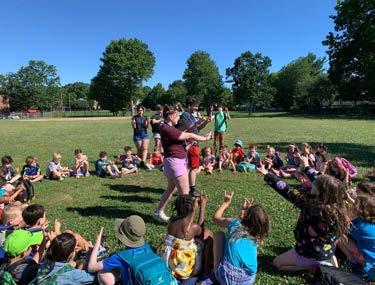
Tuesday | April 1
Sisterhood of Temple Beth-El Women’s Community Seder. 6-8:30 p.m. 70 Orchard Ave., Providence. Festive Passover Seder filled with singing, dancing and other traditions. Vegetarian menu with vegan option. For women of all faiths and girls 8+ years. RSVP by 3/17. Cost: $39 | a table (8-10 seats) for $360. A portion of cost will go to The Jewish Federation of Los Angeles Wildfire Relief Fund. Information, tbesisterhood70@gmail.com.
Thursday | April 3
Temple Sinai Judaism Beyond the Basics. 7-8:30 p.m. 30 Hagen Ave., Cranston. This adult ed class, taught by Rabbi Goldwasser, will meet on Thursdays from 4/3 thru 5/8. Topics will include Jewish mysticism, Jewish views on sexuality, responses to antisemitism, our relationship with Israel and Talmud study. Open to prospective and recent converts, those in interfaith marriages and anyone who wants to learn more. Information, Templesinairi.org, dottie@templesinairi.org or 401-

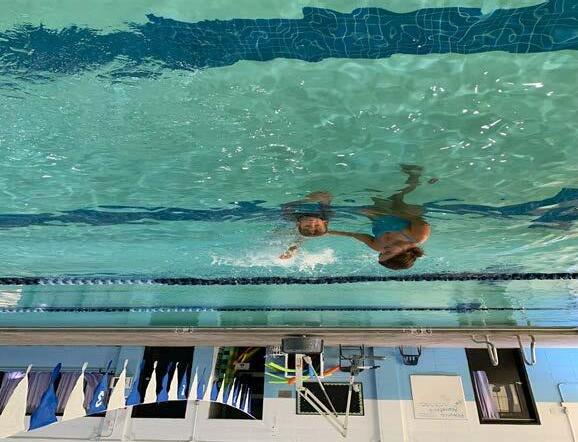
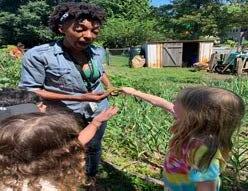
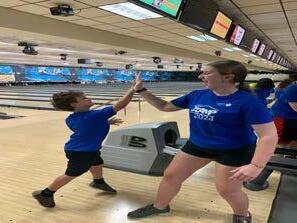

Campers enjoy a diverse and welcoming environment with a theme and corresponding activities every week. J-Camp is built on four pillars of JAMS: Judaism, Arts, Movement (athletics), and STEM.
In addition to our on-site programs, we have weekly field trips and specials guests! In the past, field trips included the zoo, local parks, museums and more.
BY JEWISH RHODE ISLAND STAFF
In the spirit of the upcoming holiday of Purim, here are several hamantaschen recipes from different corners of Jewish and fusion culture. Whether you’re celebrating for the first time, or are dusting off an old family recipe, we hope these alternatives (with literal alternatives for vegan and kosher-friendly noshing) can make your table feel a little larger and more welcoming this holiday.
EMBRACE THE FORCES of two powerhouse Jewish baked goods joining together with this everything bagel hamantaschen recipe from Micah Silva, author of “Nosh: Plant-Forward Recipes Celebrating Modern Jewish Cuisine.” This recipe takes it up a notch by incorporating a chive cream-cheese filling. For those who are new to noshing on this purim treat, the bagel likeness might offer a more familiar flavor!
All recipes are reprinted with permission.
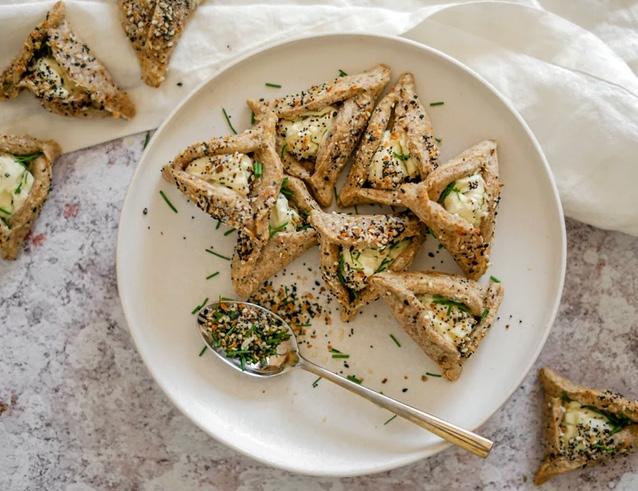
https://www.noshwithmicah.com/post/everything-bagel-hamantaschen/
Author: Micah Siva for the San Diego Jewish Journal
Total time: 60-90 min
Makes 16-18
INGREDIENTS
Dough
1 cup all-purpose flour
1 cup whole wheat flour
1 tsp baking powder
2 tbsp everything bagel spice seasoning
1 stick (1/2 cup) butter, cubed
1 large egg, whisked
4-5 tablespoons water, ice cold
Filling
2 tbsp fresh chives, chopped
3/4 cup cream cheese
To assemble
¼ cup everything bagel spice seasoning
1 egg yolk, whisked
1 tbsp water
DIRECTIONS
In a food processor, combine flours, baking powder, and bagel spice.
Cut in butter until it resembles a coarse meal. Stream in the egg and add water 1 tbsp at a time until a dough forms.
Cover with plastic wrap and let sit for 1 hour. Meanwhile, preheat the oven to 375 degrees F. Line 2 trays with parchment paper. In a medium bowl, combine chives and cream cheese.
On a floured surface, roll dough to ¼ inch thickness. Cut 3-inch circles, and transfer to the lined baking trays. Portion ½ tbsp filling in the center of each circle. Brush the outer edges with egg wash. Fold or pinch into a triangle shape. Brush the tops with egg wash, and sprinkle with everything bagel spice. Bake for 13-15 minutes. Let cool on the tray. Enjoy!
TRY SOMETHING totally different with this sushi hamantaschen recipe from Family Friends Food. The author notes that vegan substitutions for protein include veggies, tofu, beans, sprouts, and vegan mayonnaise is available if needed to make a side sauce/dressing! https://family-friends-food.com/sushi-hamantaschen/#Sushi_hamantaschen_%E2%80%93_ not_traditional_still_delicious
INGREDIENTS
100 g brown sushi rice (or use white sushi rice)
200 ml cold water
1 tablespoon rice vinegar
1 teaspoon sugar
2 sheets nori (roasted seaweed)
1 baby cucumber
2 radishes
1/3 red pepper
1/3 carrot
1 spring onion
1 tablespoon mayonnaise (or vegan mayo)
1 teaspoon sriracha
1-2 teaspoon black sesame seeds
DIRECTIONS
Wash the sushi rice under running water. Drain and place in a small saucepan with the cold water. Cover with a lid, bring to a gentle simmer, and cook, covered for 25 minutes (or according to the directions on the package).
In a small bowl mix the
rice vinegar and sugar. Set aside.
Cut 10cm (4 inch) circles from the nori sheets. I did this by folding each sheet into quarters then using scissors to cut circles. (I used a 10cm round cookie cutter as a guide but you can do it by eye.) You will need 8 circles.
Finely dice the cucumber, radishes, red pepper, and carrot. Slice the spring onion into halves or quarters lengthwise, then slice finely. Mix all the vegetables in a small bowl with the mayonnaise (or vegan mayo) and sriracha.
Once the rice is cooked, mix in the vinegar-sugar mixture, then spread the rice on a plate to cool.
To assemble the sushi hamantaschen Place ⅛ of the rice (roughly 1-1½ tbsp) in the centre of one of your nori circles. Top with 1-2
teaspoon of the vegetable filling.
Lightly brush the edges of the nori with water, then fold up the sides to create a triangle shape. Pinch the corners together and hold for a few seconds - the water should help the nori to soften and stick together. Transfer the sushi hamantasch[en] to a serving plate and continue with the remaining nori, rice and filling. (You may not use all the filling).
Sprinkle the sesame seeds over the sushi hamantaschen. Serve and enjoy!
Note
You might not need all the vegetable mixture to fill your sushi hamantaschen, however any leftovers make a delicious crunchy salad, or a spicy sandwich filling - enjoy!
TRY A SAVORY TWIST on hamantaschen inspired by North African Jewish flavors. Please note that this recipe is not kosher. The recipe’s author, Emily Paster of West of the Loop, notes that “a tomato sauce would also go well with the lamb filling. Or simply drizzle some tangy pomegranate molasses over the hamantaschen for a no-fuss sauce!” https://www.westoftheloop.com/2018/02/20/savory-hamantaschen-lamb-filling/
INGREDIENTS
Dough
2 tsp instant or active dry yeast
1 cup plus 2 TB warm water
Pinch sugar
3 1/2 cups bread flour
Pinch salt
1 TB extra virgin olive oil
1 egg
Filling
2 TB extra virgin olive oil
1 small yellowonion, finely diced
2 cloves garlic, minced
1 lb ground lamb
1 TB tomato paste
1 TB chopped preserved lemon
1 tsp schwarma spice
1/2 cup peas (frozen is fine)
2 TB pine nuts
Yogurt Sauce
3 to 4 cloves garlic, minced Juice of two lemons
Pinch salt
2 cups plain Greek yogurt
2 tsp dried mint
DIRECTIONS
Preheat oven to 350. Prepare the dough: if using active dry yeast, dissolve the yeast with a pinch of sugar in 1/2 cup warm water and leave for ten minutes until it froths. (If using instant yeast, skip this step and mix instant yeast directly in with the flour.)
In a large bowl, combine flour, salt, oil and egg and add the yeast mixture. Mix with a fork and work in remaining water as needed for dough to hold together. Knead for five to ten minutes until dough is smooth and elastic.
Place dough in well-oiled bowl, cover and set aside in a warm place to rise until doubled, about one hour to one hour and fifteen minutes.
While the dough is rising, make the filling. Heat the olive oil over medium heat in a large saucepan. Saute the onion until softened, about five minutes. Season with salt and pepper.
Add the garlic, lamb, tomato paste, preserved lemon, and schwarma spice and cook, stirring, until
the lamb is no longer pink. Add the peas and pine nuts and saute a few additional minutes until the peas are heated through and the pine nuts toasted. Taste and add salt and pepper if needed. Set aside. When dough is risen, punch down and divide into four pieces. Keeping other pieces covered, take one piece and roll it out on a lightly floured board as thinly as possible.
Cut dough into 4-inch rounds. Gather up any dough scraps and roll those out as well. You should have 6-7 rounds of dough. Place a heaping tablespoon of filling into the center of each round.
Using two hands, fold in two sides of the circle and pinch together. Fold up the bottom side of the triangle and pinch all three corners together. (Close well or pastries will open up when baked.) Repeat with remaining dough and filling.
Place filled pastries on a baking sheet lined with parchment paper or a Silpat baking mat.
Beat egg with one tablespoon of water. Brush pastries with egg wash.
Bake pastries for 25 minutes until golden brown. Cool on a wire rack.
While pastries are baking, make yogurt sauce. Combine minced garlic, lemon juice and salt in medium bowl and allow to stand for five minutes to soften raw garlic flavor. Combine garlic mixture with the Greek yogurt and mint. Season well with salt and pepper. Drizzle with extra virgin olive oil. Serve warm or room temperature with yogurt sauce.
Leftover pastries can be stored in the refrigerator for several days. Reheat or toast before serving. Pastries can also be wrapped well and frozen. Thaw and reheat before serving.


Presented by the Sisterhood of Temple Beth-El
"#$%$&'$(!)*!'+$!,-%'$#+..(!./!0$123$!4$'+563!
#$%&$'"#()*#')#+)$%#*,#$%#'-"#."/01"#2"'-341#5""'$%6#78119#:;#<=>-8=?# @&"%*"9#A=)&$?"%>"9#BC#D)=#)*=#"E>$'$%6#0=)6=8/F##G)/"#8%?#"%+)(#)*=#H$1/,9 $%,0$=$%6#/)?"=8')=,9#8%?#="D=",-/"%',F#@?/$,,$)%#$,#D=""I#
We invite you to join us in the Temple Beth-El Meeting Hall, 70 Orchard Avenue, Providence, RI for our exciting program. Come and enjoy our �ilms, inspiring moderators, and refreshments. Admission is free!
,7&(8*9!:2#-3!;!8'!<=>>!"?!
J8="K"119#5=F#78DD/8%%#
Sunday, March 23 at 2:00 PM
2=$"D#C%'=)?*>'$)%#8%?#L))/#0=","%'8'$)%#D)11)K$%6#K$'-#M8="%#B"N#B*?"19 O"K$,-#A8=$,#.)*=#P*$?"#
No Name Restaurant
Moderated by Rabbi Preston Neimeiser
,7&(8*9!:2#-3!@A!8'!<=>>!"?! !-(#'-"#O"K,# 5)?"=8'"?#N(#B8NN$#A=",')%#Q"$/"$,"=#
Sunday, March 30 at 2:00 PM
All About the Levkoviches
Moderated by Rabbi Heather Shore
Boys like to make noise to drown out the name of the bad guy, Haman, and girls like to save the family to reward the guidance of Mordecai through the aid of a beauty contest. Purim is a plural word like “dice” and appeals to the kinder, the kids. The playfulness of the festival permits me to bring up some springtime memories. I offer a few glimpses of springtime memories of our vacation retreats.
YOU SEE , my parents always celebrated the sunny seasons with summer retreats. We had a wondrous Oakland Beach house with a gigantic apple tree in the backyard. But get this: we had an “ice box” – quite literally – in the kitchen, and a truck would deliver gigantic blocks of ice, with a big axe, and install a big hunk in the wooden cabinet.
Depression, and we had a wind-up record player with a giant needle and arm, and just a few records that I could find and play.
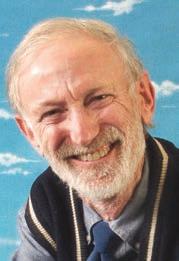
Now, this was the late
One was Spike Jones’ Decca record of “Ve heil, right in da fuhrer’s face!” Another single song quite different and calming was “Just a cottage small right by a waterfall!” Between the pair of ‘em those long-ago single melodies, one escapist and
the other mocking, sum up the Depression chapter of my early summers. They provide the background music to trips with my youngest uncle, who took us to the beach in his home-made skiff.
We had another little place for the escape from school days and weeks, in Hampden Meadows. There my handy mom transformed the contents of the cluttered closets that came with the house into household wonders. The abandoned croquet set provided a couple of towel racks, while my dad used the
other mallets to assault the naughty squirrels, mice or skunks in the garage.
My nickname in those days was ever and always the name of a song with a Yiddish source, “Nature Boy.” The song was brought to Nat “King” Cole’s studio in 1947 by its composer eden ahbez (born George Aberle in 1908). He passed it to Cole’s valet Otis Pollard, who fortunately passed it along to Cole. It became his biggest hit and my lifelong nickname.
Moving along a bit, we had a few more fair-weather friendly summer bolt holes, one near Wickford, at Narrow River. Recently a former student came across a snapshot of my mom at the river-front dwelling and turned it into a strangely wondrous painting. It took me back to a magical time. And we, my wife and I, purchased a place and filled it with images and
mementos of our children’s lives. These chapters in the story of times gone by turned into nostalgic reminders of our yesteryears.
Those little rooms no longer fit or suit today’s hopes and expectations, but for me they hold magic. Every charming weed or surprising wildfowl (like the visiting hummingbirds for whom my wife provides sweet treats) reminds me of times past, seasons perhaps inspired by the spirit that follows the season after Purim. This is a time when our pleasures should be modest, our demands minimal, and our play inspired by the spirit of childhood with hopes as varied and nostalgic as childhood hopes are everywhere.
MIKE FINK (mfink33@aol. com) is a professor emeritus at the Rhode Island School of Design.

BY GEORGE M. GOODWIN
IN 1950, my parents built our family home in the Westwood-Brentwood neighborhood of Los Angeles. This was a new, hillside suburb northwest of UCLA and east of the Pacific Palisades. A decade later, my twin brother, Theo, our younger sister, Betty, and I watched as the San Diego Freeway was carved out of the nearby Sepulveda Canyon.
Having made various additions and renova tions, our parents stayed in their beloved, one-story residence for no fewer than 50 years. Then they moved to a Westside condo, where my maternal grandfather, George, and his second wife, Carolyn, had lived. Both Mom and Dad were fortunate to spend their final years there.
Center, which are a short drive from Thurston Avenue.
How about the schools that we Goodwin kids attended? Our hillside elementary school, which had opened when Theo and I entered kindergarten, closed its doors decades ago because young families could not afford nearby homes.
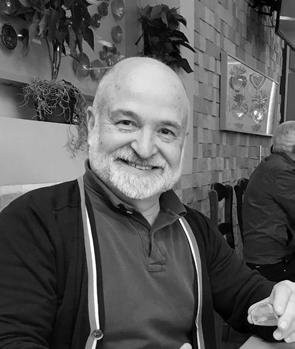
Emerson Junior High, a bold example of a modern design, was constructed in 1937. I’ve driven by a few times in recent years to gaze at its forlorn campus while pondering mostly happy memories.
recently erected. The Temple had also built a Reform day school in West L.A. Unfortunately, both of the Temple’s Malibu camps, beloved by generations of children and staff, were destroyed by a wildfire in 2018 and have not yet been rebuilt. But unlike the 100-year old temple in Pasadena, which perished in the recent fire, our temple still stands.
This time was my third visit there but I remember so well my astonishing first visit, in 1978, when a guide at Ben Gurion Airport proclaimed, “Welcome home.”
For dozens of summers, our family has spent a few delightful days at a favorite seaside spot in Maine. In recent years, we have also been privileged to take our two grandkids there.
asked if she could borrow or have them, he refused, proclaiming, “They came with the house.”
But our home on Thurston Avenue remained in our family, for Betty, Keith, and their young son, Aaron, soon moved in. Yes, they made many changes to suit their needs and tastes, but the gorgeously-landscaped, ranchstyle home remained both a haven and an oasis.
Betsey and I met in Los Angeles, and we lived in a small condo until 1985, when we moved to Minnesota and then a few years later to Providence. We have loved living in our Arts & Crafts bungalow for 28 years. Our kids, Molly and Michael, and I also became deeply attached to Betsey’s childhood home north of Boston, where her parents remained for nearly 60 years.
Whether traveling with family or alone, I’ve returned home to L.A. more than a hundred times. Yes, I’ve kept a record. Am I homesick or a pilgrim? I do miss a great deal about my hometown but don’t regret moving away. Needing to find or build my own niche, perhaps such a move was inevitable.
Theo and his family, like most of our cousins and classmates, also moved elsewhere to build lives of their own. But there is so much I still love about Los Angeles, especially its distinguished art museums, including the Getty Villa and the Getty
One of my assignments at Emerson was to write a paper about a local landmark, and I chose Will Rogers State Park in the Pacific Palisades. Little did I know then that its ranch house, whose cowboy gear and Native American artifacts so intrigued me, would be destroyed, along with so many homes, businesses, and places of worship by the devastating fire in January.
Theo and I were 12-yearolds, studying for our bar mitzvah, when I wrote my Will Rogers paper. It was also the first time that we tried hitchhiking. We were thrilled when Zsa Zsa Gabor, driving a shiny black Rolls Royce, picked us up on Sunset Boulevard and took us home. We expected to be scolded for our risky behavior, but she smiled and then remarked, “See you around, boys.”
Yes, a few movie theatres endure, but so much else in and around L.A. has changed. For example, most of our family’s favorite restaurants, shops, and department stores disappeared long ago. At almost any hour, traffic on freeways and surface streets approaches gridlock, and the cost of real estate is now absurd.
Fortunately, Betty, Keith, and Aaron still belong to our family’s Wilshire Boulevard Temple. The glorious building, which was constructed in 1929 a few miles west of downtown, has been magnificently restored, and an enormous, three-story addition, housing a social hall, was
As for other kinds of homecomings, I have attended numerous high school and college reunions, but some of my favorite journeys have been returning with Betsey to Italy, where I studied art history in 1969. Indeed, we once took a peek inside the “pensione” or boarding house in Florence where I had felt so privileged to live. It’s now a tiny hotel but its magnificent views of the cathedral complex are still there.
In 2015, Betsey and I met our kids in Israel where, on my first visit I experienced another kind of connection.
In 1986, Betsey and I went to a cousin’s bar mitzvah in Cincinnati, where Mom’s family has lived since the 1850s. Of course, we were eager to take another look at her childhood home, but Dad was opposed to asking its current owner for permission to enter. Mom was determined, however, and we were kindly invited inside.
Dad was right, for so much had inevitably changed. But beneath a coffee table’s glass surface rested several photos of the Rosenthals, which we did not remember. The owner explained that he had found them in the attic. When Mom
Mom’s ancestors, parents, and older brother are buried in Cincinnati, but when Betsey and I return to Los Angeles, we visit many Goodwinsgrandparents, aunts, uncles, and my parents- whose remains reside at Hillside, a Westside cemetery. These are treasured moments, but far less joyous than visiting our family’s home.
How grateful we are that it somehow survived the recent Palisades Fire! Betty, Keith, and Aaron did pack up many heirlooms and fled for a few nights. Fortunately no homes were destroyed in the Thurston neighborhood, but I feel for all those who lost the moorings of their homes and who may suffer deep psychic wounds ever after. Not to mention the families of others whose lives were extinguished.
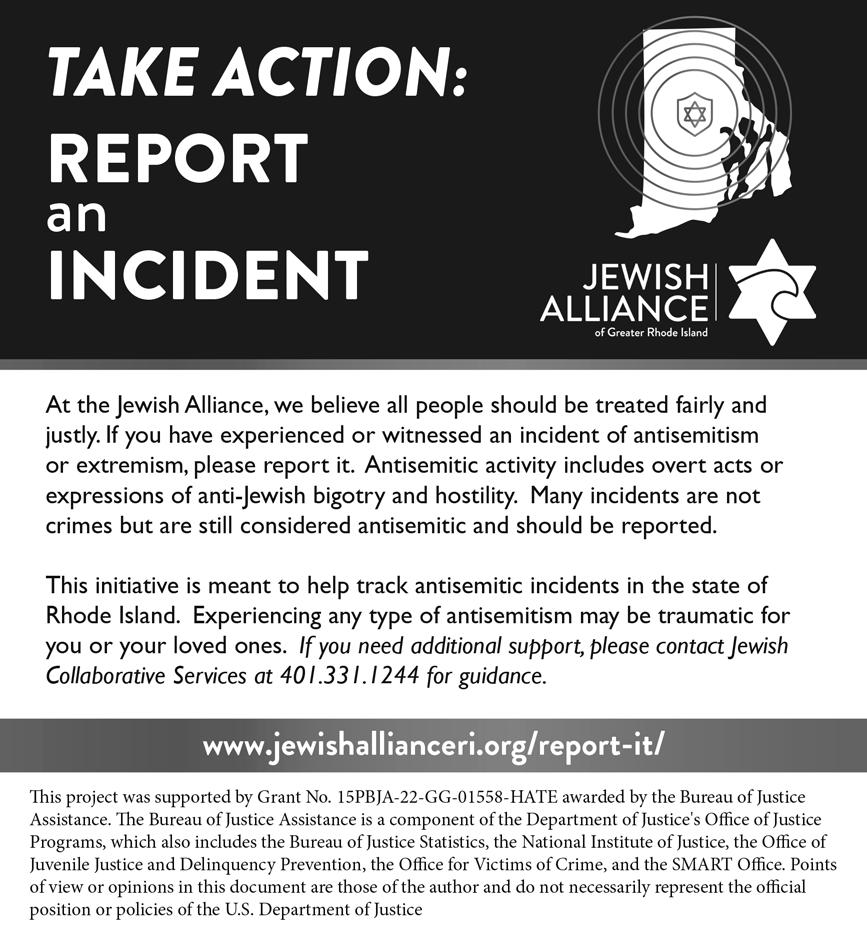
There is much written about the Jewish garden, which is deeply rooted in spiritual, cultural and historical traditions.
HERE ARE SOME of the insights I found:
The Garden of Eden is central to Jewish theology, symbolizing humanity’s first task of caretaking the earth (Genesis 2:8-9)
Shelley S. Cramm in “Biblical Feasts, Garden Poetry, Gardens to Visit” writes, “in a personal patterning of Genesis 2, the Lord gently revealed the way He had for them to get started, like Him, from the ground up.
trees, I found this information about the significance of the olive tree at myolivetree.com. There is a movement that plants trees for longterm sustainability in Israel. Their website states:
Brown’s article in Kveller.com “How to Create Your Own Jewish Garden” (Yes, It’s a Real Thing!” and Katherine Greenberg’s article in pacifichorticulture.org, “Making a Garden in Jerusalem.”

“And the LORD God planted a garden in Eden, in the east; and there he put the man whom he had formed. And out of the ground the LORD God made to grow every tree that is pleasant to the sight and good for food…”
Speaking of the importance of
CONTINUED FROM PAGE 4
his own label, Simon Says, which was purchased by ABC Paramount. In each anecdote, Shapiro faces combative managers, bad contracts, budget fiascos, stiffed raises and his own dramatic resignations. In Shapiro’s telling, corporate greed and impersonal business practices drove him out.
“I was very bothered by what I saw happening in the publishing business, being taken over by big money-making companies and harming the industry that I grew up in,” he says. “That really bothered me and was a major factor in me wanting to get away from what I was doing. I sort of grew up feeling if I tell somebody something, that’s the truth. And I found that that wasn’t true, dealing with big companies.”
Shapiro’s journey to Rhode Island was convoluted, involving a distribution company, an unexpected profit margin and a lawsuit. He had an apartment in Boston for years, but he knew nothing about the Ocean State. Nevertheless, in 1982, he relocated with his wife, Joyce, an English-born photographer.
“The olive tree is mentioned frequently in the Bible with regard to fruitfulness, health, and blessings. It is one of the seven species with which the land was blessed. Eventually, people began to associate it with the concept of “putting down roots” in the Holy Land. The olive tree and olive branch are symbols of peace, wisdom, and prosperity in Judaism. They are also associated with renewal, hope, and the eternal connection between humans and the earth.”
In addition to the importance of planting trees, we can create our own gardens with plants that have Jewish significance. I discovered and read, with great interest, articles on how to create a Jewish garden. These resources are Mike
Mostly, he says, he wanted to escape from the rat race.
“I knew that no one knew where Rhode Island was, so it was a good place to go,” Shapiro says with one of his characteristic guffaws.
The couple first rented a house in North Kingstown, and they felt so comfortable there that they bought the place.
“It was very good for me in a number of ways. It was good for my marriage. I was home every night now; no more traveling. My wife and I had a wonderful time, almost like a second honeymoon. We went to inspect the state of Rhode Island. We were out every night, going to different restaurants.”
A good way to start is to choose plants mentioned in the Bible. Examples are pomegranates and figs, and also horseradish. Yes, horseradish.
So, if you If you are thinking ahead to Passover, Mike Brown suggests this method to grow your own horseradish. “It is best to start off growing horseradish in a large container, at least five gallons or so. This will give the plant enough room to develop nice roots, which is the part used to make horseradish condiment. It will also grow nicely in the ground but it spreads easily from the roots and so it is very hard to get rid of once it is in the ground.”
Katherine Greenberg’s article article lists the plants in her garden in Jerusalem. The biblical plants included are fig (“Ficus carica”), olive (“Olea europaea”), dwarf pomegranate, (“Punica granatum” or “Nana”) and myrtle (“Myrtus communis”).
but the younger audience was lukewarm, and the title only survived a few months.
Then one day, Shapiro learned that the magazine’s distributor was planning to retire. Shapiro made an offer, and in 1994 he became the owner of Special Delivery.
“I started [in] the business that I have now, which is distributing for other people,” he says.
‘The time to retire is when you’re in your 30s, when you can really enjoy it...'’
In Rhode Island, the Shapiros felt true stability. They settled in and raised two sons, Peter and Michael.
In the early ’90s, Shapiro made a decision that would shape the rest of his career. By that time, he was running his own publishing company and helping to publish a magazine called TV Jr. The magazine emulated TV Guide,
Today, Special Delivery is housed in an unassuming warehouse in East Greenwich. The space is located so close to the railroad tracks that the whoosh of Amtrak trains frequently interrupts conversation. Periodicals are stacked on wood pallets, and Shapiro moves them around with a forklift he operates himself.
Three part-time delivery drivers work for the company, but Shapiro has only one fulltime employee, his son Peter.
Other plants, spices, seeds, herbs and flowers listed in the Hebrew bible (in that order) are papyrus, acacia, cedar, anise, cinnamon, frankincense, almonds, cassia and lilies.
The best advice given in the articles is to start small. Growing your own garden and teaching your children and grandchildren how to tend it also gives you the opportunity to pass on Jewish tradition and use eco-friendly practices.
And last but not least, to give gratitude for the fruits of our labor in planting our garden, we can recite the shehecheyanu blessing, “Blessed are You, Adonai our God, Sovereign of all, who has kept us alive, sustained us, and brought us to this season.”
PATRICIA RASKIN , owner of Raskin Resources Productions, is an award-winning radio producer, business owner and leader. She has served on the board of directors of Temple Emanu-El, in Providence. Her “Positive Living with Patricia Raskin” podcast can be heard on voiceamerica.com
At age 63, Peter is also the youngest person on Shapiro’s team; the nonagenarian prefers to work with older people.
“They will show up when they’re supposed to,” he says. “They will go where they’re supposed to go. They will actually do what they said they were going to do. Unfortunately, I don’t think I could do that with the younger generation today. This is the kind of business where you really like what you’re doing, or you really don’t.”
While Shapiro feels strongly about personal relationships, he has never shown much interest in his own ancestry. He opted out of a Bar Mitzvah at age 13 because his older brother had spent so much time writing thankyou notes. His father’s family came from Chicago, but many of those relatives were estranged, for unknown reasons, and his mother moved to the U.S. from Odessa when she was four. What Shapiro remembers of his mother’s Ukrainian background was her superb ethnic meals.
Joyce Shapiro passed away two years ago. These days, Shapiro revels in his two grandchildren and two
great-grandchildren.
When he turned 89, Shapiro received a book from his son Michael, 65, who works as a cruise director. The self-published volume was a collection of family photographs and Shapiro’s words of wisdom: “Pick your parents carefully, so you get good genes”; “Under no circumstances … stop breathing – people may do things you don’t like”; “The time to retire is when you’re in your 30s, when you can really enjoy it; the time to go back to work is when you’re my age, in your 80s. You may as well, you can’t do anything else anyway.”
That last quip begs the question: How long does Shapiro plan to keep working?
“As long as I’m able to,” he says.
Want to follow Shapiro on his route? Check out our video about him at JewishRhody. com.
ROBERT ISENBERG is a freelance writer and multimedia producer based in Cranston. His latest book is “Mile Markers: Essays on Cycling.”
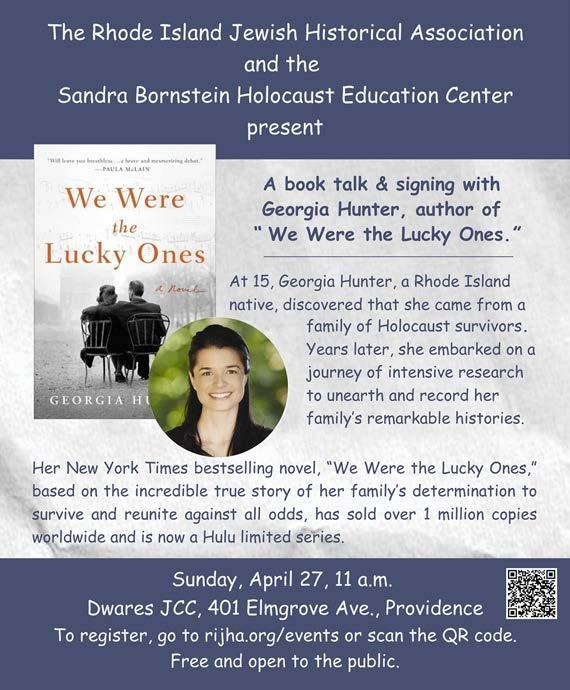
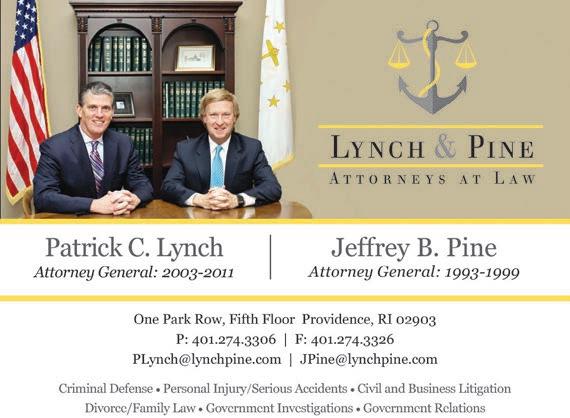

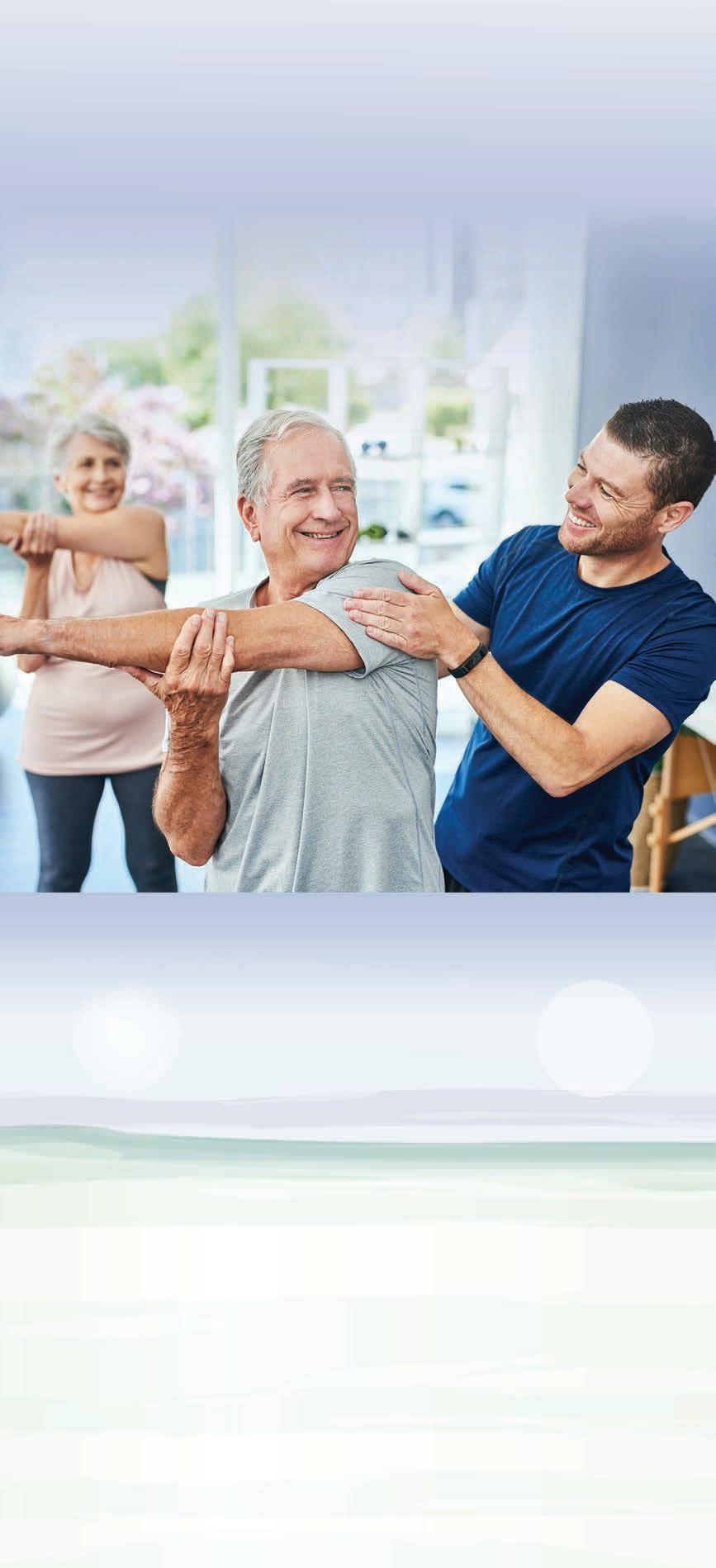



























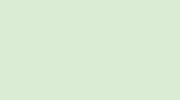










I WAS GLAD to see Rabbi Aaron Samuel Tamares (1869-1931) mentioned in Rabbi James Rosenberg’s February 2025 “It Seems To Me” column.
Tamares studied at the Kolel ha-Perushim in Kovno founded by Rabbi Yisrael Salanter, followed by two years at the Volozhin yeshiva, and served as the rabbi in the village of Milejczyce, in the Białystok region. McGill University Professor of Jewish Studies and History Gershon David Hundert z”l, in his entry on Tamares in “The YIVO Encyclopedia of Jews in Eastern Europe,” quoted from a 1913 article of Tamares’ that “for us, the Jewish people, our entire distinctiveness is the Torah and Judaism; the kingdom of the spirit is our state territory.” Hundert added: “In this essay and elsewhere, Tamares attacks Jewish nationalism as a subversion of the purpose of the Jewish people, which inheres in ethics and spirituality. Thus, he argued, Jewish life in exile has a positive value.”
Tamares’ writings on issues like exile and diaspora, Torah study, freedom, Zionism, nationalism, and violence and pacifism – some of which are available in Rabbi Everett Gendler’s “A Passionate Pacifist: Essential Writings of Aaron Samuel Tamares – remain relevant and challenging.”
Morty Miller Cumberland, RI
IN MY COLUMN this past January, I wrote about The New York Times columnist David Brooks (b. 8/10/61), who came to the newspaper in September 2003, to replace William Safire as their “designated conservative.”
As I pointed out at that time, it seems that over the years Brooks has been sliding leftward from a fairly traditional “rightish” Republican stance to a man who could be defined as a political and social moderate who occupies a position a bit right or a bit left of center, depending upon the particular issue; he now appears to be a man who is trying to lay out a path that can bring together the redder and bluer sections of America into a single red, white, and blue United States.
soul, God. In June of that same year his spiritual growth was strengthened by his experience of sitting solo in silence at the shore of a mountain lake in Colorado, reading passages from a volume of Puritan prayers.
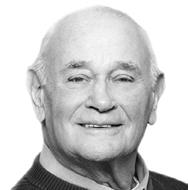
Much to my surprise, this past Dec. 22 Brooks departed from his usual political/social analysis and turned inward in search of his own soul, devoting his long Sunday “Opinion” piece to “My Decade-Long Journey to Belief.” Now, at age 63, he writes about his formative years, when “You could say that I was religious but not spiritual. I grew up in a Jewish home where we experienced peoplehood more than faith. I went to a Christian school and camp where I sang the hymns with pleasure, not conviction. I lived through decades of Jewish adulthood (kosher home, the kids at Jewish schools) but all that proximity still didn’t make me a believer.”
During the past couple of decades, Brooks has had certain “numinous experiences…scattered moments of awe and wonder that wash over most of us unexpectedly from time to time.” In April 2013, Brooks entered a Manhattan subway car and had the overwhelming sense that every person in the car possessed a soul, leading to his conviction that the entire universe has a spiritual element that we call a
As Brooks has continued his spiritual journey, he has come to see how much he has been nourished by both Jewish and Christian traditions: “Today I feel more Jewish, but as I once told some friends, I can’t unread Matthew. For me, the Beatitudes are the part of the Bible where the celestial grandeur most dazzlingly shines through. So, these days I’m enchanted by both Judaism and Christianity. I assent to the whole shebang…”
Brooks chooses to quote David Wolpe (b. 1958), a widely respected American rabbi, often engaged in interfaith dialogue: “Spirituality is an emotion. Religion is an obligation. Spirituality soothes. Religion mobilizes, Spirituality is satisfied with itself. Religion is unsatisfied with the world.”
I am not sure why Brooks chooses to include Wolpe’s quote in his opinion piece, for it is at the very root of what makes Judaism and Christianity travel down separate paths toward religious fulfillment.
The renowned German rabbi, liberal theologian, teacher (and survivor!) at the Theresienstadt concentration camp, Leo Baeck (1873-1956), wrote pointedly – and at times polemically – about some essential differences between Judaism and Christianity. He emphasizes, for example, that Judaism insists upon maintaining a balance between mystery and commandment, between a profound emotional trust/belief in God and a more rational commitment to “obey”

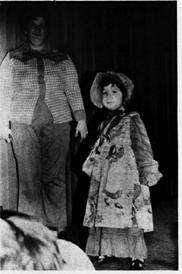
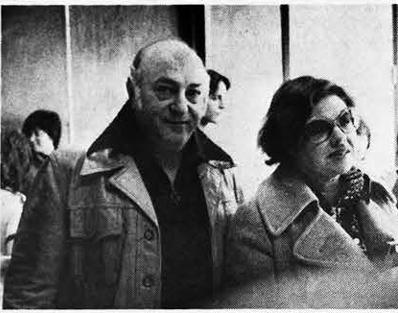
Divinely ordained commandments. In his lengthy essay, “Romantic Religion,” Baeck writes that certain forms of Pauline Protestantism, with their emphasis on faith and grace, upset the balance between feeling and action: “The only activity of the genuine romantic is self-congratulation on his state of grace.”
Both Rabbi Wolpe and Rabbi Baeck derive their emphasis of deed over creed, action over feeling, from an oftquoted dictum found in section of our Talmud known as Pirke Avot, Sayings of our Fathers, which I translate as “It’s not the teaching itself which is of the essence, but the doing.”
Ever since I became rabbi of Temple Habonim in Barrington, where I served from 1974-2007, I have participated at several differentlevels of interfaith activity. Whenever there was an appropriate opportunity, I underlined what I consider to be a significant difference between Judaism and Christianity with regard to the intricate relationship between law and love. Over time, I developed the following formulation: For the Christian, love (agape, not romantic, not sexual) renders law unnecessary. For the Jew, it is law that renders love possible. Law – understood as doing the “right thing” no matter what you happen to be feeling – provides needed structure for your emotions, negative as well as positive.
As Brooks states midway through his essay, “So these days I’m enchanted by both Judaism and Christianity. I assent to the whole shebang.” I wonder whether Brooks fails to see such major differences between Judaism and Christianity or rather chooses to ignore them.
JAMES B. ROSENBERG is a rabbi emeritus at Temple Habonim in Barrington. Contact him at rabbiemeritus@templehabonim.org.

IN MARCH 1976, the weekly Rhode Island Herald dedicated a two-page spread to photographs of Purim celebrations and costumes at the Jewish Community Center. The editors ended up with such a wealth of photographs that the Herald ran an additional Purim series in the following week’s paper.
BY MENACHEM Z. ROSENSAFT JTA
My friend and colleague Deborah Lipstadt recently announced that she turned down an invitation to teach at Columbia University, citing anti-Israel protests on campus and how the school has handled them.
I SHARE Professor Lipstadt’s concerns. But I’ve made a different decision. I am continuing and planning on continuing to teach about genocide at Columbia Law School despite the antisemitism that has plagued the university for the past year and a half.
First, I must emphasize that I am not criticizing Professor Lipstadt’s decision in any way. She is the epitome of not just a woman of valor but an individual of the highest possible merit, accomplishments and intellectual integrity. The academic’s academic, she defeated a notorious Hitler-loving Holocaust denier in a London court of law. An acclaimed author and professor, she served with great distinction as the U.S. State Department’s special envoy to monitor and combat antisemitism in the Biden administration.
Most importantly for me, she is a dear friend of long standing for whom I have nothing but the highest respect, affection and admiration, and with whom I had the privilege to serve for many years on the board of
the U.S. Holocaust Memorial Museum. I respect her decision-making in all regards and believe it is her absolute prerogative to turn down any role and to publicly explain why. In fact, we all need to take seriously Professor Lipstadt’s arguments, which she laid out in The Free Press, that she does not believe the university’s administration is serious in its commitment not to tolerate continued instances of violent anti-Israel and antisemitic demonstrations and disruptions of the type that have plagued the Morningside campus since Oct. 7, 2023. Specifically, she maintains that Columbia’s “recent history regarding demonstrations suggests that it has far less than a firm commitment to the free exchange of ideas, or to preventing classroom disruptions or even condemning disrupters and their demonstrations.” She also fears that her presence at Columbia “would be used as a sop” to cover up the failure to fight antisemitism adequately, and that she and her students might not be safe.
But even as I cannot take issue with any of these points, I cannot and will not follow her lead. And I hope that other Columbia faculty members, Jewish and non-Jewish alike, who have been appalled by the callously abhorrent behavior of radical activists, including some of their colleagues, will similarly stand their ground.
I hold two degrees from Columbia – a master’s in modern European history and a law degree – and I have been teaching a course on the law of genocide at Columbia Law School since 2011. I am also an adjunct professor of law at Cornell Law School, where I teach about antisemitism in the courts and in jurisprudence. At the end of August 2023, I stepped down as general counsel and associate executive vice president of the World Jewish Congress.
I am neither unaware of nor insensitive to Columbia’s serious failings. Following the Oct. 7, 2023, slaughter of approximately 1,200 Israelis, the vast majority of them civilians, I was publicly critical of then-President Minouche Shafik’s refusal to condemn the Hamas perpetrators of that savagery by name. I have also taken the university’s alumni magazine sharply to task for ignoring the exploding antisemitism at Columbia. Like Professor Lipstadt, I am outraged by the Barnard administrators’ kowtowing behavior toward student
protesters last week. At the same time, I have watched with respect and appreciation as many senior members of the Columbia administration and faculty –including Interim President Katrina Armstrong, Dean Daniel Abebe, Dean Emeritus David M. Schizer of the law school and Dean Keren Yarhi-Milo of the School of International and Public Affairs – have demonstrated a strong and, I am convinced, utterly sincere commitment to have the back, as it were, of the thousands of Jewish students immersed in this crisis. (Cornell’s interim president, Michael I. Kotlikoff; President Emerita Martha Pollack; and law school dean Jens David Ohlin, incidentally, have been and are admirably steadfast in this respect as well.)
In the final analysis, this is why I continue to teach at Columbia: the students. And not only the Jewish students. The students in my class there this semester are Jewish, Christian, Sikh and, in all likelihood, Muslim and Buddhist. They are American, Italian, French, Australian, Indian and from a number of other countries. They deserve to be taught that antisemitism was the malignant cause of the Holocaust just as anti-Muslim bigotry caused the genocide of Bosnian Muslims at Srebrenica, and just as ethnic hatred caused the genocide of Tutsis in Rwanda. They deserve to be taught
that Hitler admired an American antisemite named Henry Ford and that the Nazis’ antisemitic jurisprudence was largely and directly cribbed from American Jim Crow and anti-miscegenation laws. They deserve to be taught that Zionism is not racism but a multifaceted response to centuries of antisemitic oppression and persecution, that Jews are as entitled to have a nation of their own like other peoples across the globe, and, yes, that the Palestinians are entitled to these very same rights as well.
The vast majority of Columbia’s student body is made up of decent individuals who are neither antisemitic nor pro-Hamas. The same holds true for the university’s faculty, administrators and staff. I do not want to abandon them at the very moment when they are most in need of support.
MENACHEM Z. ROSENSAFT is a lawyer and human rights activist, adjunct professor of law at Cornell Law School, lecturer-in-law at Columbia Law School, and author of “Burning Psalms: Confronting Adonai after Auschwitz.”
The views and opinions expressed in this article are those of the author and do not necessarily reflect the views of Jewish Rhode island, JTA or its parent company, 70 Faces Media.
BY PHILISSA CRAMER
(JTA) – The White House has confirmed that U.S. officials are holding talks with Hamas representatives in an effort to negotiate an end to the Gaza war.
Adam Boehler, the Trump administration’s hostage envoy, who is Jewish, met with Hamas officials in Doha, Qatar, in recent weeks, according to a report in Axios by the Israeli journalist Barak Ravid, which cited unnamed sources. The Associated Press reported that White House Press Secretary Karoline Leavitt confirmed the talks.
“Look dialogue and talking to people around the world to do what’s in the best interest of the American people is something that the president has proven is what he believes is [a] good faith, effort to do what’s right for the American people,” she said, according to the AP.
The talks are unprecedented: Previously, the United States and Israel have negotiated only through intermediaries with Hamas, which has been designated as a terror organization by both countries for decades. The United States has also previously generally aligned with Israel, rather than negotiating separately from it.
Hamas officials have reportedly confirmed the talks in Arab media, saying that Steve Witkoff, Donald Trump’s Middle East envoy, had also participated. Axios reported that Witkoff, who is Jewish, had planned to fly to Doha, the site of previous indirect talks, but an unnamed official said he called off the trip “after he saw there was no progress from Hamas’ side.”
The office of Israeli Prime Minister Benjamin Netanyahu said in a one-sentence statement that it had made its position known to U.S. officials but did not elaborate: “Israel has expressed to the United States its position regarding direct talks with
Hamas.”
Boehler’s responsibility is to achieve the return of Americans held illegally abroad. Five of the remaining 59 Israeli hostages in Gaza are Americans: one, Edan Alexander, who is believed to be alive, and four who are known to be dead.
President Donald Trump has sent mixed signals about the future of the war, which has been paused for more than six weeks amid a temporary ceasefire that expired this week. He has said that he wants an end to the war and that he would support whatever choice the Israelis make about how to prosecute the war.
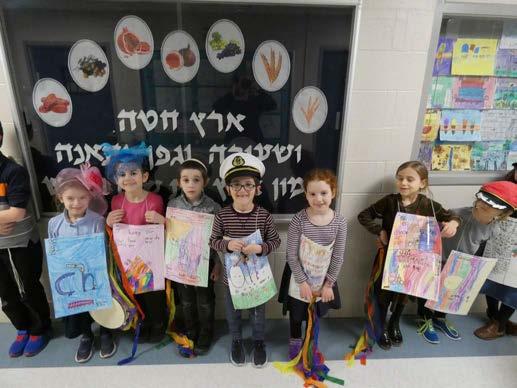
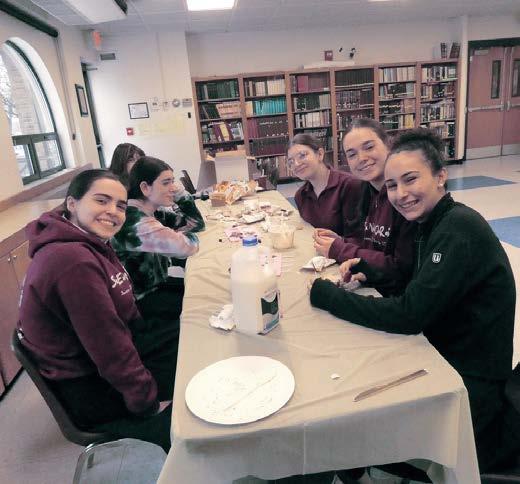
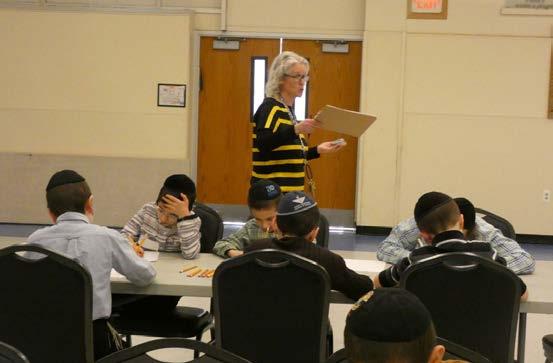
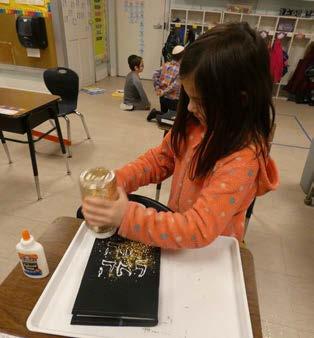
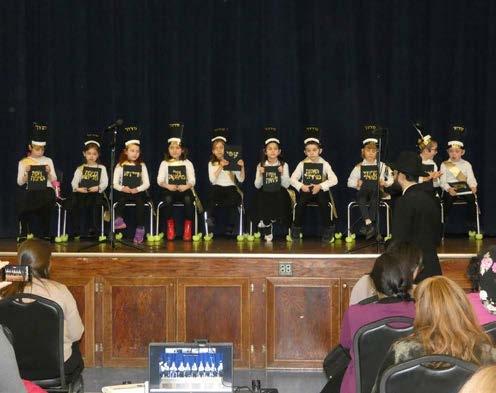
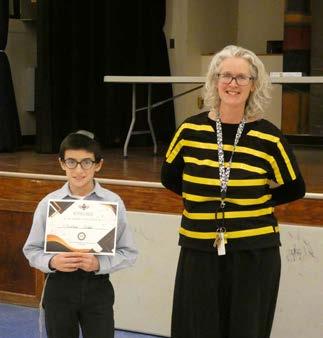
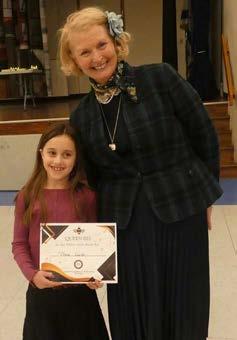
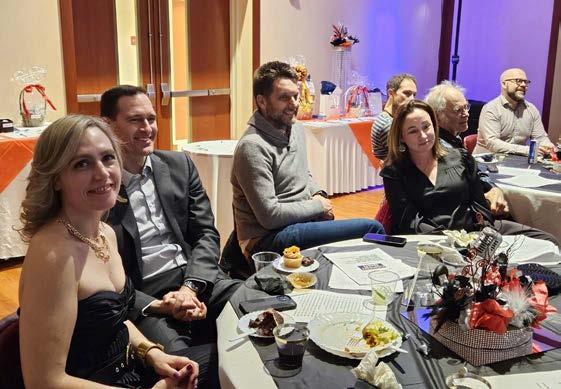
BY ELAINE SHAPIRO
EAST GREENWICH – A packed house of over 150 members and guests enjoyed an unforgettable evening of laughter, dinner and spirited bidding at Laugh the Night Away III, held on March 1 at Temple Torat Yisrael. The sold-out
fundraiser featured passed appetizers, charcuterie tables, dinner, dessert, an outstanding comedy show, auctions and raffles, making it a night to remember.
At the conclusion of the comedy show, attendees participated in a live auction and silent auction, 50/50
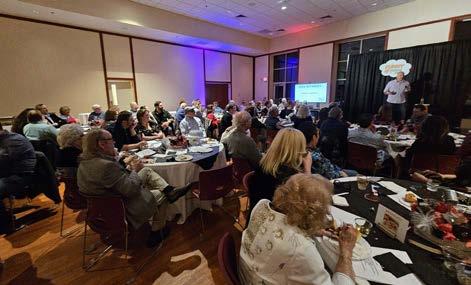
raffle, and two crowd-favorite fundraising trees: a lottery ticket tree and a restaurant gift card tree. The live auction's highlight came when Temple Torat Yisrael's Rabbi Ari Saks, in a moment of impromptu humor, auctioned off two dozen eggs entirely in Hebrew – bringing in an astonishing $400. To go one better, Rabbi Saks offered a second flat of two dozen eggs, and the winning bid was

matched by another attendee!
The event not only entertained but also raised crucial funds for the synagogue, reinforcing its strong community spirit. Guests left with smiles, prizes, and the satisfaction of supporting a meaningful cause, proving once again that laughter is a powerful tool for bringing people together.
Temple Torat Yisrael, a Conservative synagogue,
offers a warm, inclusive and holy community for Jews of all ages and stages. For more information about TTY and membership opportunities, please visit its website toratyisrael.org or call 401-885-6600.
ELAINE SHAPIRO is co-vice president of Ways and Means at Temple Torat Yisrael.
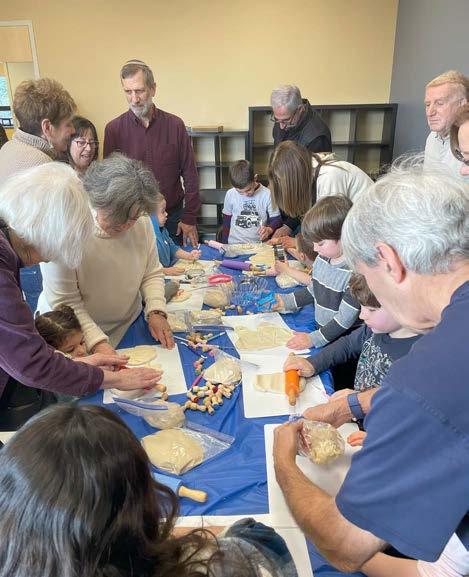
Bubbies, Zaydes and grandfriends gathered with their young friends on Sunday, Feb. 23 for a PJ Library activity as part of the monthly Day at the J at the JCC in Providence. Everyone had a blast making a craft, eating bagels and listening to a PJ Library story. Watch for more “Bagels with Bubbies” at future Day at the J events.
is spring at JCDSRI
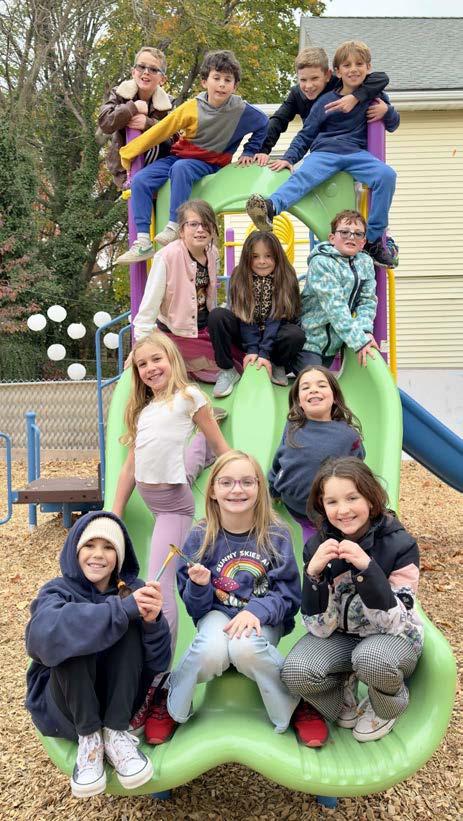

Monday, June 9, 2025
Warwick Country Club 394 Narragansett Bay Avenue, Warwick
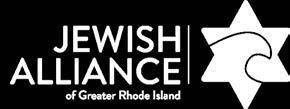

BUSINESS 28 | OBITUARIES 29
BY EMMA NEWBERY
Cantor Debby Gelber is a singer, first. Yet, when asked how she’s acclimated to the congregation at Temple Sinai in Cranston, where she’s been serving as cantor since January, she says: “it’s really all about listening.” Gelber, a Stonybrook, New York, native who grew up singing in her synagogue choir, followed a community-led trajectory into cantorial work.
OF THAT SYNAGOGUE choir
Gelber says, “I always liked participating more than just sitting” – but didn’t set out to become a cantor. It was after a series of positive experiences, including work with a lay-led synagogue in San Francisco, California, and a tenure as the cantor for Stanford Hillel, that she decided to pursue formal training at Hebrew College for a certificate in cantorial arts in 1999.
It was through a chance phone call that she incorporated the other major component of her practice: b-mitzvah tutoring. Gelber began her career as a cantor in 2000, serving as a tutor at Congregation Eitz Chayim in Cambridge, Massachusetts, under Rabbi Sherry Kohler Fox, and as a parttime cantorial soloist in Franklin, Massachusetts –both positions she still holds 25 years later.
As cantor at Temple Sinai, she works closely with Rabbi Jeff Goldwasser to craft engaging and meaningful services for those who observe. Gelber is delighted to be bringing her work to a congregation such as Sinai for one simple reason, “they love to sing!”
“I want to understand what the community enjoys, and what they already know,” she said, in a recent
BY LEAH HALUNEN
AS THE WINTER season fades away, the days are growing longer, there is a slight warmth in the air, and we are beginning to thaw. Spring is on its way, and it brings along with it the opportunity to start fresh, to clear out the old and welcome the new.
Perhaps you have already begun to create your “spring cleaning” to-do list. This concept embraces the idea of sorting through your home, your car,
interview, positing that starting with more familiar tunes and versions of prayers will allow her to gradually introduce new ideas, too. Some of her favorite sources from which to draw are “music coming out of Israel, or [the Hadar Institute] in New York” that connects to Jewish history. She emphasizes the participatory nature of synagogue and the importance of singing together in community to strengthen the congregation’s connection to its Jewish roots.
The cantorial and rabbinical partnership is key to that goal. “I like to work with rabbis who are inspirational and organized,” said Gelber, laughing.
“Rabbi Goldwasser is both. He really encourages me to bring my full self to the congregation.” Whether navigating small shifts and changes to daily goings on or the uncertainties posed for American Jewish communities since Oct. 7, 2023, Cantor Gelber and Rabbi Goldwasser work side by side, “it’s a partnership,” she said of the pairing.
Gelber said that, since coming to Sinai in January, there have been several poignant components of communal prayer, specifically related to the horrors unfolding in Gaza and the
West Bank for Israelis and Palestinians alike. How does one balance the traditional joy of a weekly observance like Shabbat, with the marking of the return of hostage remains, or news of leafleting and threats of mass displacement and continued violence in Palestinian territories? Questions such as these, which often remain in question form for us, are the very issues that drive Gelber’s work. Her answer? Mindfulness.
“Rabbi Goldwasser and I are discussing introducing contemplative chanting meditation services,” she said. They hope that a specialized approach will allow for all congregants to take away what they individually need from prayer during this period.
Gelber also has a passion for teaching Torah chanting to both children and adults, emphasizing the importance of patience and scaffolding in learning. The most important things she emphasizes in her teaching are that practice decreases nerves, and that a close working relationship can allow for even the shyest people to feel empowered to raise their voices in song. Her “big break,” she recalls, wouldn’t have come without her husband dutifully writing, by hand, the
your office and purging items that are no longer serving your highest good. If you haven’t yet thought about what you would like to “spring clean” from your life, take this as your sign that it’s time. Tending to a garden can also be a nice way to bring peace into this new season. These activities can be quite beneficial not only for your mental health but for your physical health as well.
The physical benefits that accompany spring cleaning and garden-
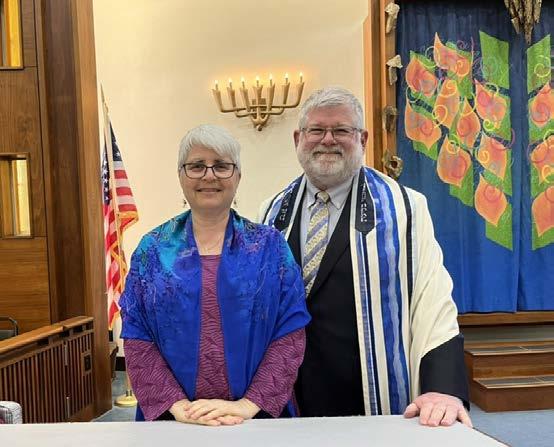
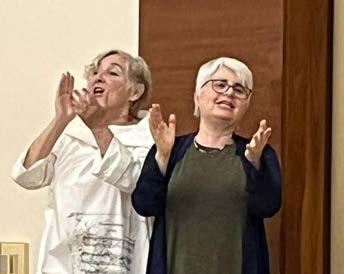
entirety of her first performance’s sheet music. She never forgets that act of care as she passes on similar patience and steadfastness to her students. Beyond the congregation, she and her husband’s joint love of music has permeated their family, too. One of Gelber’s three daughters fronts the band Good Judgement, “the spunkiest garage-folk band in the Northeast” as per their website. (https:// linktr.ee/goodjudgement?fbclid=PAZXh0bgNhZW0CMTEAAaaTmucM_c9ZNLzLY9ALXptOg_P7a7LItteNX7GA1NdQ_hYHWwg9wF9Q4iA_aem_ElPGmgrUKXTdMA8bHdjeig).
Whether the blessing is one you’ve recited for years, a tune or pronunciation new to you, or you are not familiar with Jewish prayer,
ing are abundant. Both encourage movement and exercise that can help to improve cardiovascular health, strengthen muscles and increase flexibility. Cleaning tasks such as sweeping, scrubbing, lifting and organizing engage different areas of the body. Similarly, digging, planting, weeding and raking in a garden provide movements which promote stronger circulation and improve stamina and coordination. All these movements will burn calories which helps one
Gelber has a message she hopes congregants and readers alike will take from her work:
“Don’t be afraid to sing, you know? Even if you were told you shouldn’t sing, or you should mouth the words,” she laughs, but continues seriously: “singing is everybody’s right of self-expression.”
EMMA NEWBERY (enewbery@ jewishallianceri.org) is a staff writer and podcast host for Jewish Rhode Island.
to maintain a healthy weight and reduces the risk of chronic ailments like heart disease and diabetes. The improvement of air quality in one’s home or office is another physical benefit that comes with spring cleaning. During the winter season, dust, mold and allergens can accumulate in these spaces which could trigger allergies or respiratory issues. Removing pollutants through
BY RACHEL LEVY
Iboarded an El Al plane on Jan.16 wondering what peace would look like in Israel if there was a ceasefire. On my first day in Israel, the Houthis welcomed me by sending a Kassam rocket to Kfar Saba where I was staying with my cousin. We quickly ran to her safe room where we stayed for 20 minutes until the shrapnel from the two rockets had landed. She asked if I wanted to go out for coffee, but I suggested that we spend the day close to the safe room in case we needed it again.
ON SUNDAY NIGHT I met up with the executive directors from each of the Jewish Federations in Southern New England to spend four days in our partnership region of Afula-Gilboa. We were all concerned to learn more about how our sister cities have been coping since Oct., 7. Here are stories of three of the people we met.
Youth Futures is one of the Jewish Agency’s flagship programs that connects youth at risk with a mentor. It provides emotional and psychological support for middle school children while also connecting with their families and teachers to provide a holistic program. I heard the story of Yoav who is 11-yearsold. He traveled with his family from Afula to the south to visit his grandparents to celebrate Sukkot in 2023. On Oct. 7, Yoav and his parents heard dozens of Kassam rockets in their neighborhood. Hamas was attacking from the air and his father got hit in their home. Yoav’s mother, Hadar, applied pressure for three hours to her husband’s wound, but there was so much blood that he died in her arms. Yoav and his mother continued to hide for 30 hours trapped in their home with no ambulance rescue and no way to get help.
his school and in the community center. She provided the emotional and psychological support that Yoav needed to rebuild his life and move from crisis to growth. Hadar is so grateful to Youth Futures for its support for her son Yoav.
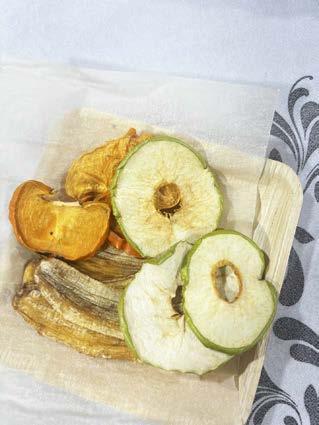
He was very lucky to be alive, but it would be a very long road to recovery. Now 500 days later, he is still going to physical therapy for rehab at HaEmek Hospital. He was one of many soldiers that we met who was trying to regain his strength and the use of his limbs. He was very grateful for our visit.
Idan is a mother with two young daughters who lives in the north very close to the border with Lebanon. Over the past four generations their families have worked in agriculture in Israel. Idan and her husband decided to
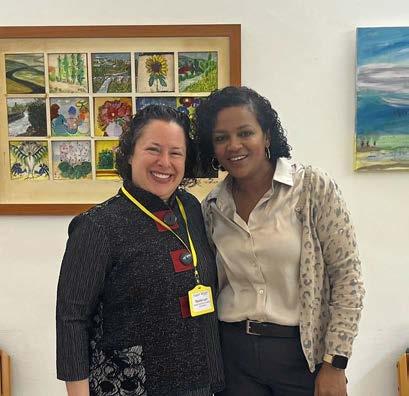
open a factory to make dried fruit using the skills they had acquired. When the war began, her factory was hit by two Kassam rockets that destroyed her banana fields, avocado trees and killed her two horses.
She lost her factory and her entire dried fruit business in an instant. Fortunately, she and her family survived by hiding in their bomb shelter. Many of the homes in their neighborhood caught fire and burned down. As Idan waited for the government to provide her with funds to rebuild her business, she reached out to SparkIL. SparkIL was able to provide her with a small business loan to begin rebuilding her farm and her
When they were finally able to leave their home, Hadar’s first phone call was to Youth Futures. She connected with Yoav’s mentor in Afula and explained the traumatic situation that they had just experienced. The mentor immediately sprang into action to build a safe space where Yoav could return in Afula. She met with Yoav at his home, in
in Afula Nitzan, age 30, was called up for Reserve Duty on Oct. 7. He met his three army partners and got into their tank to drive into Gaza. As they were driving, he heard on his walkie-talkie that there was an RPG heading into the area. It took him a few minutes to realize that the RPG was going to hit his tank. He opened the top to try to escape, but it was too late. The RPG struck the tank, and he flew 20 feet in the air. His arms and legs were filled with shrapnel. He lay on the ground and could not open his eyes or remember where he was. From the pain, his body went into a coma. The rescue team brought him and his partner to the hospital, but his partner did not survive. When Nitzan woke up several days later, he learned what had happened.


BY MARSHALL H. COHEN
THE ADDRESS was delivered with a backdrop of economic and political uncertainty highlighted by U.S. trade wars with Mexico, Canada and China and the pausing of military aid programs with Ukraine. He mentioned briefly, but with little development, the return of Israeli and American hostages, and the ceasefire agreement with Hamas. At several points, hed criticize former President Joseph Biden's economic policies despite the data which proves otherwise. He also made reference to his ongoing need to reclaim the Panama Canal built by Americans, and to strengthen U.S. national security by buying Greenland (this proposal was instantly rejected by both Greenland and Denmark). These and many other “applause lines” were robustly supported by Vice President J.D. Vance and Mike Johnson, speaker of the House of Representatives shown behind the president. He ended his 90-minute address with a flurry of self-directed back pats and the promise of America’s coming “Golden Age.”


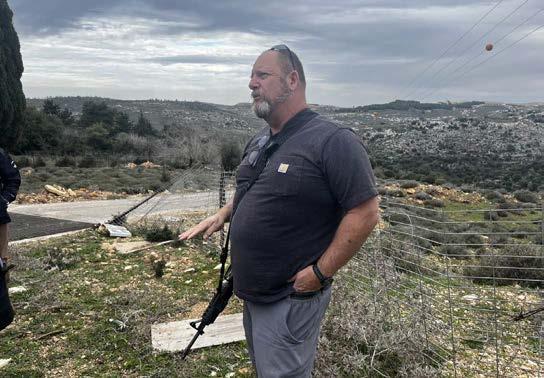
CONTINUED FROM PAGE 19
factory. As she told us her story, she explained that her children have settled into new schools farther away from the border. Even though the government has told them it is safe to return to Betzet, they want to finish the school year with their friends and not be disrupted again.
With so much happening in our country, it is easy to forget that the war in Israel is still an ongoing crisis.
On this trip I visited two mothers who lost their children on Oct. 7. They were both still living the horrors of 500 days ago. They have
not gone to the shopping mall, returned to work or taken a family vacation. They are still grieving as if time has stood still. I was devastated to hear their stories and cry with them. I promised that their children’s stories will not be forgotten.
Now that I have returned, I am thinking about what it means to be part of a living bridge with Israel. I look forward to dreaming with you.
RACHEL LEVY, of Providence, is the Executive Director of the Jewish Federation of Eastern Connecticut.
BY SHAINA WEINTRAUB
PROVIDENCE – Located in the new Stephen Robert ’62 Hall on Brown University's campus, the “Looming in the Shadows of Lodz” photo exhibit invites the public to view a remarkable, poignant journey through the lens of photographer Leslie Starobin. Running from Feb. 15 to May 30, this exhibit showcases a curated collection of 20 photographs that delve into the haunting memories of the Holocaust, blending silent historic visuals with deafening narratives.
LESLIE STAROBIN'S work was inspired by a roots journey she made to Poland in 2019 with her husband and children, marking the 75th anniversary of their relatives' deportation to Auschwitz from the Lodz Ghetto – the last ghetto to be liquidated by the Nazis. Through her lens, Starobin captures the remnants of the Altman family’s past, including their residences, the cemetery where they hid and the Radegast train station where they were forced
CONTINUED FROM PAGE 18
vacuuming, dusting and washing fabrics will make your space much healthier. Decluttering, too, is a great way to minimize buildup which can lead to illness and discomfort.
Gardening is also an excellent way to boost immune function. By working with your hands in the soil, you are exposing your body to beneficial microbes (germs) which work in the body to reduce the likelihood of infection and inflammation.
Sleep is something that almost no one gets enough of. According to the Centers for Disease Control (CDC), about 1 in 3 American adults don’t get enough sleep on a regular basis. A clutter-free, clean home can have a direct impact on sleep quality by reducing stress levels allowing you to sleep more soundly. Working in a garden
onto cattle cars bound for the death camp. Upon entering the exhibit, visitors are greeted with an appropriately quiet and contemplative environment that suits the heavy subject matter. The exhibit is housed in an open space on the first floor of Stephen Robert ’62 Hall, where there are couches and tables for students to work at, yet these are not distracting. The curation is thoughtfully done, with each photograph spaced out on six different
exposes us to natural sunlight which helps to regulate our circadian rhythms and improves melatonin production leading to a deeper, more restorative night’s sleep. Poor sleep is linked to a host of negative consequences like obesity, heart disease, diabetes, anxiety and depression. Adequate sleep is the link between our physical and mental well-being. We all could use more of that.
Like a good night’s sleep, spring cleaning and gardening can reduce stress by providing a sense of control over our environment. With the chaos of our everyday lives, the high cost of healthy foods like fruits and vegetables, and the high cost of medical care when lack of all these things results in health problems, sometimes it’s easy for our minds to spin out of control with a sense of wonder at how life got so complicated.
walls, allowing viewers to pace themselves and fully absorb the emotional weight of each piece.
One photograph that stood out is “Directly to the Ovens, Ruins of Crematorium 2 Auschwitz II – Birkenau, 2024.” This image captures the remains of a destroyed crematorium, demolished by the SS to erase evidence as the war was ending. Surrounding the photograph, like all others in the exhibit, are diary entries by the artist's mother-in-law, Tola, a Holocaust survivor.
This particular entry reads: “The Germans brought the transports directly to the ovens. Big, open trucks full of people. Totally nude. They saw us dressed and standing for work. They were screaming like jackals. – Tola.” The juxtaposition of the still image with the vivid, harrowing diary entry elicits profound emotion and a sense of movement, making it a jarring and impactful experience.
The photographs and
Cleaning and gardening can give us a healthy and productive focus to clear the mind, to grow our own produce which also relieves stress on our wallets in addition to our minds, and to bring beautiful flowers into our now clutter-free homes and offices. Mood boosting tasks such as these usher in a sense of renewal. Mental clarity is enhanced by a well-organized space; gardening also releases endorphins, the brain’s natural feelgood chemicals, which combats symptoms of depression and anxiety. The vibrant colors and fresh scents in a garden and the connection to nature gives us a sensory experience that uplifts the spirit.
Mindfulness, presence, increased self-esteem, and a sense of accomplishment are all positive benefits to our mental health that are associated
diary entries work together to create a powerful “beforeand-after” effect. The diary entries, paired with corresponding photos, help viewers imagine the gravity of the emotions and experiences of those who lived through these traumatic events. The artist's statement provides valuable context, explaining the “why” behind the exhibit and the chosen style. Without the diary entries, the photographs might seem like historical images seen in books or online. However, the firsthand accounts of those who experienced these moments bring a depth of feeling and personal connection that is often missing in typical historical documentation. The exhibit also features a QR code linked to video testimony from the artist's husband's aunt, Dorka, adding another layer of personal narrative. This multimedia element allows visitors to hear the voices and stories behind the photographs, deepening their understanding and engagement.
with spring cleaning and gardening. Social connection could also be a result of gardening as it could be a communal activity. Maybe there is a community garden in your area where you can share your talents.
Spring cleaning and gardening are not only seasonal chores, but also are powerful tools for improving both our physical and mental well-being. So, as spring approaches, take the time to embrace this sea-
Overall, the “Looming in the Shadows of Lodz” exhibit is a powerful and moving experience. Leslie Starobin's photographs transcend the ordinary, inviting viewers to pause and reflect on the beauty and tragedy of life's fleeting moments. The exhibit's thoughtful curation and engaging narrative make it a must-see for art enthusiasts and casual visitors alike. With its blend of technical mastery and emotional depth, “Looming in the Shadows of Lodz” leaves a lasting impression that lingers long after the gallery ends. The exhibit, sponsored by Art at Watson, is held at the Stephen Robert ’62 Hall, located at 280 Brook Street. It runs from Feb. 13 to May 30, open all day to the public free of charge. Parking is available along Brook Street (free) as well as in a nearby parking garage (paid).
SHAINA WEINTRAUB of Providence is a freelance writer, photographer and podcaster.
son of renewal. Open your windows, let in the fresh air and start clearing out the old and creating space for the new.
LEAH HALUNEN is a personal trainer at the Jewish Alliance of Greater Rhode Island.
As kids growing up in Barrington, Henry Schultz and his brother were awestruck by their neighbor Vinu Malik, who trained for ironman competitions. “My brother and I would see him running down our street and we’d always think he was really cool. That’s what led me to being interested.”
THAT EXPERIENCE as a kid in the neighborhood led Henry to train for his first ironman competition in the summer of 2024. As a junior at Barrington High School, Henry began thinking about his senior project, a requirement for graduation. Senior projects are broad based and there are few restrictions. Some students coach Little League, others might build a guitar, while some pursue science-based or community relations projects. Students need to complete 20 field hours and have a mentor from the community.
For Henry, the challenge of completing an ironman, which includes running, swimming and biking, soon became his obsession during his junior year.
“When I first told my parents I wanted to do it they kind of laughed at me because they said, ‘There’s no way you can swim that far.’ ‘You’ve never run a marathon before.’ It was definitely a mental challenge I set for myself as well as physical.”
Henry had a background in competitive running and playing tennis, but the swimming and biking portion of the competition would take much longer to master.
“I have a running background. I have been running cross country and track. I used to bike around town with my friends. Swimming for me was a very big challenge. Back in January I could not even swim one full lap of the pool. So, every morning I would go and swim as far as I could and eventually, I kept getting farther and farther.”
As part of their senior project, students need mentors from the community to guide them. For Henry, it was a simple choice, his neighbor, Vinu Malik, who “has done 36 Ironmans, [and] seven Kona World Championships.”
“Vinu really was the perfect mentor. He made a training schedule that coincided with my schoolwork because junior year is super busy. I guess it started out a little easier and then progressively it got to a little over 25 hours a week, up to maybe 30 hours.”
Vinu was all too happy to mentor Henry. He lives a few doors down from Henry and his family, and watched him grow up. “Henry used to ride his bike to the Middle School in all seasons. I could see he was
motivated, and he is one of the best runners at Barrington High School. I also have a long history in triathlons and ironmans”
Training for a triathlon “is a big undertaking,” noted Vinu. “But Henry was motivated. You need to be at least 18 years old, and Henry was 17 at the time. My first competition was at the age of 17, some 40 years ago, so it was like looking in the mirror.”
One of Vinu’s first areas of focus was to design a training program for Henry. They worked backward, starting with the July date of the ironman competition. Many factors were taken into consideration such as schoolwork, final exams and the weather in New England in April, which can be cold and rainy. According to Vinu, “it was a periodization process. The first two months are base building, the mechanics of the sports, not mileage. Months three and four are about pacing, and then the final two months are the big miles and then taper off the week of the race.” Henry had roughly five months to train.
Early in the process, Henry had to stop after a few weeks into the first training cycle. His body did not have enough calories. The goal was to increase his caloric intake to 5,0006,000 calories a day, about triple his normal intake.
His mother focused on his nutrition and smoothies became a focal point of his diet. Carbs became his main driver each day. He would wake up each morning, eat oatmeal, swim and then have a smoothie, eggs and toast. His smoothies were usually 1,000 calories. At school, he would snack and have lunch, which was usually the smallest meal of the day. Exercise would follow and then more food. For dinner, he would eat pasta with protein, since pasta alone was not a sufficiently calorie dense meal.
According to Vinu, most young kids do not understand sports nutrition. He encouraged Henry to eat more protein and fewer processed foods, anything that would not hold him back from his highest performance training.
One of the biggest lessons learned during this process was time management. During the school year, Henry enrolled in six Advanced Placement classes so managing his
class work with training became a key focus of his efforts. In the process, Henry leaned on the emphasis in his Jewish upbringing on perseverance and never giving up, making it through the training and to race day.
“The hardest part for me was just training by myself for that long, because all my friends were doing track and cross country. I wasn’t used to training alone and it definitely tests your commitment and dedication, especially when you’re accustomed to having a coach and teammates.”
But Henry continued training and before long race day was here.
Lake Placid, New York, became the site of Henry’s first ironman. Vinu competed at Lake Placid 16 times and felt that this was the best fit for a first-time competitor like Henry.
According to Vinu, the original ironman company runs the Lake Placid event, so it is a well-managed event. “It had three things going for it. First, it has a good race set up. Second, it is the biggest race that is closest to New England. Third, I have raced it 16 times. It is an Olympic village town and a good experience, but a tough course.”
“I never doubted that I would be able to finish the race, but there was a time when I hurt my foot a month or two out from the race,” recalled Henry. “It turned out not to be anything too serious, and I was able to keep running, but that was slightly concerning for me. I was pretty upset when that happened because I had already put months of training into it. I rested for a week and thankfully I was able to keep running, and it went away by itself. “
“Going to the line I was super nervous…After putting in so much work I think that is what really made me nervous, because I wanted to be able to display all the work I put in, and I didn’t want anything to go wrong. It’s such a long race; there’s a lot of points for something to mess up your day.”
The night before the race, Henry was up much of the night as both nervousness and excitement kept him awake as he anticipated the following day.
Come race day, though, Henry was ready. For him, the course was beautiful. He swam in the lake and ran through the hills in town.
Throughout the day, he saw his parents on the course, which was a source of inspiration.
“They actually were cheering me on throughout the course. I saw them maybe three or four times, and whenever I saw them, I had a boost of energy. A lot of energy came from
talking with other athletes who I was racing with on the course. And the fans on the course were amazing. Because it’s a long day.”
It was a long day, but soon enough, Henry could see the finish line.
“I was so tired. My legs were like… the last two or three miles, my legs were struggling to keep running, no matter what pace. I don’t think I had ever felt like that. It was an interesting feeling. It was still a lot of fun, even through the finish line. I was still having tons of fun. And seeing all the people around me, it was so much fun.”
“We got some food that night. I was so tired. I went straight to bed. Lights were still on, and I fell asleep.”
After savoring his accomplishment and having time to reflect, Henry concluded that he was, “happy but not satisfied. I want to improve my time in the future. I am not where I want to be.”
How would Vinu evaluate Henry in his first competition? “He did a fantastic job. He was the youngest competitor of 2,500 to 3,000 people competing. He had a respectable time with less than six months training. He felt that he left a lot on the table and had higher expectations. I would give him an A+ for effort and commitment.”
Henry sees this race and experience as a starting point for future competitions.
“I planned out a rough plan of what I want to do the next few years, because I really want to come back to that race and redeem myself. I know there’s a few mistakes I made in terms of pacing that would save me a lot of time. I’m not sure if I want to do it next year…maybe the year after and try to qualify for Kona.”
He plans to run in college, most likely at the University of Vermont. For Vinu, “running in college is a special opportunity. It will help build his cardiovascular system for later in life. Being in a Division I program will improve his fitness. He should try to be the best college runner he can be and fit in the biking and swimming when he can and maybe run shorter races the next few years.”
“Henry is a quiet, ambitious competitor and this experience will take him a long way. [Deciding to compete in an ironman] speaks volumes to his character and will pay off for the rest of his life.”
DOUGLAS STARK , of Barrington, is a writer, museum consultant, and sports historian.
BY ROBERTA K. SCHNEIDER
The Rhode Island chapter of Hadassah, a vibrant Jewish Women’s Zionist organization, offered the first part of the “Let’s Talk” 2-part series focused on sharing ways to preserve Jewish family history. The theme was, “Everyone has a story to tell”. The “LET’S TALK” Zoom events offer an opportunity for open discussion about the kinds of issues that develop a stronger Jewish community.
AUTHOR SANDRA TARADASH, from the San Francisco Bay area in California, shared personal situations that were the catalysts for her three different memoirs; “Snippets”, “Chapters” and “Recipes with Lessons.” She made a case for the obligation to share family histories, and with them lessons about Jewish values. These values, that were infused into our lives, can then be passed down through the generations in a meaningful way.
Yardena Winkler, who lives in Israel part of the year and is president of the chapter, shared her interpretation of them. The values that are often modeled in Jewish homes include justice (“tzedakah”),
loving-kindness (“chesed”), community responsibility (“kol Yisrael arevim zeh lazeh”), respect (“kavod”), repairing the world (“tikun olam”) and treating others with dignity (“derekh eretz”). The emphasis here is on ethical conduct and contributing positively to society.
Participants were sent a list of prompt questions prior to the presentation. This was followed by a revised list and a set of tools to help them write their own memoirs. The
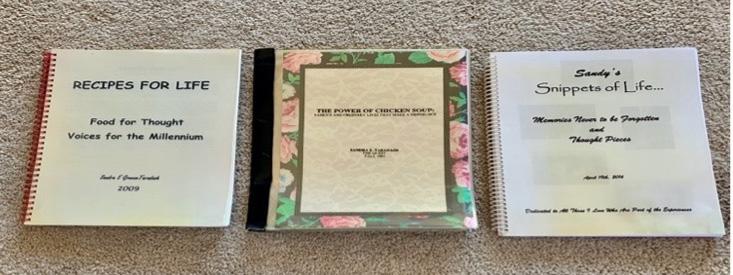
committee, offered a memory that inspired the process of starting her own memoir. She starts with:
“Once upon a time, I had a “magic table”… Every Sunday my parents and I would go to my grandparents’ home. There we sat at a small wooden table and ate a meal, but when we had company during the Jewish holidays that’s when the table grew. I always wondered how the table got so big! It had 2 leaves and was quite a project to open. The table would open up with an extra set of legs that came down. I had
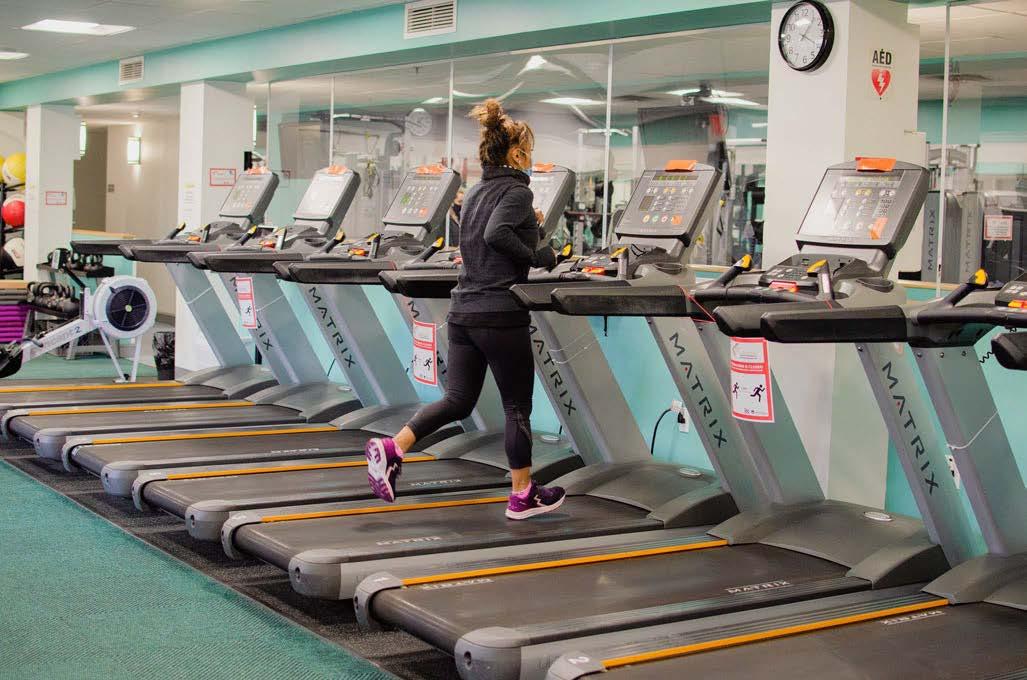


to the present and often mold the future. They have the power to unite people and create special memories.” Taradash kindly offered her assistance via email or phone to all participants as they began the process.
The second part of the program on Tuesday, March 18th at 7 p.m. is open to all. Contact chapRI@hadassah.org to be included.
Hadassah, the Women’s Zionist Organization of America, was established in 1912. Working to advance philanthropy as well as women’s


BY MINDY WACHTENHEIM
IF YOU KNOW me, you know that I have been an unwavering advocate of The Jewish Alliance and its predecessor, the Jewish Federation of Rhode Island, for 47 years! I’ve honored my three daughters and several dear friends, both for special birthdays and posthumously, with a very special and meaningful gift of membership in the Women’s Alliance Endowment Fund (WAEF). When we reach a certain
moment in life, it’s not about what we have accumulated, but rather about who we’ve become. Through its annual grants, the WAEF presents legacy opportunities that will impact and make a difference in the lives of women and children locally and globally. The WAEF was established by the Business & Professional Women Affiliate of the Jewish Federation (which later combined with the Women’s Division to create today’s Women’s Alliance). The goal was to
provide for the needs of Jewish women by supporting educational, inter-group relations, civic, cultural, health and social-service projects. With a donation of $1,000, a fraction of the investment of most things with such long-lasting impacts, a woman can participate in the WAEF. This will provide invaluable support to Jewish women and children in Rhode Island and Israel in perpetuity. Why not honor or memorialize yourself, your mom, grandmother,
daughter or special friend?
This one-time gift offers each member of the fund the unique experience of participating in the grant-giving process. More information is available at www.jewishallianceri.org/ waef or contact endowment@ jewishallianceri.org.
MINDY WACHTENHEIM , of Providence, is a past leader of women’s and endowment programs at the Jewish Alliance of Greater Rhode Island.
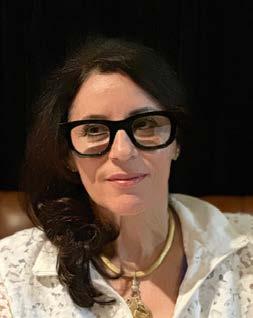
Mindy Wachtenheim
THE WOMEN’S Alliance Endowment Fund (WAEF) of the Jewish Federation Foundation of Greater Rhode Island is pleased to share its 2025 Request for Proposals. Established in 1993, the WAEF benefits Jewish women and children by supporting educational, health, cultural and social services
and programs worldwide. Nearly 150 women have contributed to the fund.
The WAEF encourages proposals for new or existing programs and services that benefit Jewish women and/or children and have the potential for long-term impact.
Grants may fund, for example, program-specific sup -
plies/equipment, specialized staff, travel, etc. Grants will not be considered for administrative equipment/supplies, payroll, multi-year funding or from organizations that have been operating for less than two years.
All Rhode Island, Southeastern Massachusetts and overseas Jewish organiza-
tions, agencies and congregations whose mission falls within the purview of the Jewish Alliance of Greater Rhode Island may submit grant proposals. WAEF encourages applicants to find community partners, which need not to be Jewish in affiliation. For overseas proposals, preference is given to those
BY BRAD SWARTZ
Camp JORI is Rhode Island’s only Jewish overnight summer camp. Located in Wakefield, this co-ed Jewish camp provides summer experiences for campers from around the world and the 75-acre facility and campus includes playing fields, a stage and theater, a rec/dining hall, multiple swimming pools, and a beautiful waterfront.
THE JEWISH ALLIANCE and Camp JORI have been longstanding partners working to ensure camp fun and funding needs are met each summer. Camp Director Kara Liberman said, “The partnership between Camp JORI and the Jewish Alliance is one that everyone at
JORI attaches deep value to. Their unwavering support in a plethora of ways, alongside our shared commitment to fostering unity within the Jewish community, has been beneficial to many individuals well beyond our organizations. The leadership team at the
Alliance has consistently provided ongoing guidance and resources, along with help in mapping what the future of all our partner organizations can look like when we work together.”
Last summer, I was fortunate enough to witness Camp JORI in action. As I walked around the campground, I noticed each activity included happy, involved, included campers. Whether watching the gaga match or the intense basketball game, every activity encouraged full camper and counselor participation, which speaks volumes to the camp’s culture so every camper can feel a part of the entire experience.
One of my favorite things about the camp was hear-
ing directly from campers where they traveled from to attend. Kids from all over the United States and beyond proudly attend Camp JORI, and some return year after year. Jewish summer camps are where kids build enduring friendships and find easy, welcoming entry points into Jewish life. As a former Jewish overnight summer camper myself, I know it is a vital connection in today’s world as it links youth from all over the globe, learning with and about one another. Counselors travel from far and wide too, which makes the experience even more invaluable.
One cannot measure fun the way a summer camper can, and all of this is made
providing services in our partner regions of (1) Warsaw, Poland, (2) Afula-Gilboa, Israel, (3) Rosario, Argentina. Email endowment@jewishallianceri.org to request an application, discuss a possible program, or inquire about joining WAEF.
Submitted by the Women’s Alliance Endowment Fund
possible through contributions to the Alliance Community Campaign, which supports Camp JORI and other essential local and overseas partners in their efforts to sustain an accessible and more supportive Jewish community. We invite you to become involved in this important work through committee membership or by donating to the Community Campaign.
Together, we can make a meaningful difference.
For more information on ways to contribute, visit Jewish Alliance’s donation page or contact Brad Swartz, Fundraising and Partnership Manager, at bswartz@jewishallianceri. org.
BY ANNABEL HERZLINGER, JANIE PALAN, JULIAN DEANER AND LIAM ISAACS
ABOUT A MONTH AGO, we traveled to Washington, D.C., to participate in the L’Taken Social Justice Seminar, an initiative of the Religious Action Center of Reform Judaism. There we met hundreds of Jewish teens from all around the country and learned about pressing social justice issues affecting our communities. While in D.C. we toured several of the Smithsonian museums and famous memorials. Once we were versed on these issues, we chose those that were close to our hearts to draft speeches with which we would lobby our congressional delegation.
I (Liam) chose to lobby
about antisemitism because of its growing presence in the U.S. following the Oct. 7 attacks and its increased prevalence in political discourse. Data from 2023 showed a 63% increase in anti-Jewish hate crimes, a number that has consistently risen year over year. It feels terrible to see people just like me being oppressed and discriminated against for the sake of their identity. This is why I lobbied for the Countering Antisemitism Act.
The bill takes action in a number of government agencies to curb and suppress the hateful ideologies that allow antisemitism to take root and flourish. Rep. Gabe Amo from Rhode Island’s First Congressional District was a co-sponsor of
the bill in the 118th Congress, and we urged him and his Senate colleague, Jack Reed, to reintroduce it as a co-sponsor in the 119th Congress.
We (Julian and Janie) chose to lobby for mental health support. This important issue is not talked about enough, and we feel personally affected as teenagers. One in 6 U.S. youth experience a mental health disorder and many do not receive the help and support they require. We lobbied in support of the Mental Health Services for Students Act. The bill would give significant allocations of money to schools to support mental health services.
Although we understand that four constituent voices may not be enough to tip the scales
toward our goals, learning to share our experiences, our fears and our “hope” to our elected officials was a thrill and an honor. We know that we are not obligated to finish the work, but we choose not desist from it.
ANNABEL HERZLINGER, JANIE PALAN, JULIAN DEANER and LIAM ISAACS participated in the Religious Action Center of Reform Judaism's L'Taken Social Justice Seminar in Washington, D.C. The annual 4-day seminar, held on several weekends in January and February, is designed to expose teens to a variety of public policy issues and explore Jewish values that inform the Reform Movement's advocacy around these issues.
BY LYNNE FREED BELL
ARE YOU one of those people who cannot wait for the ground to warm up each spring to start working outside in your garden? I and my fellow plant sale committee members certainly fall into this category and are pleased to be hosting the Alliance’s third annual spring plant sale. Come to our sale behind the Dwares JCC on the first Sunday in May to find an assortment of chemical-free vegetables and other plants ready for you to add to your gardens and home. Perhaps you will even find the perfect gift for Mother’s Day. Although we do not yet have a final list of the farmers and other vendors who will be in attendance, we assure you that you will have plenty of plants – ranging from chemical-free vegetable seed-
lings to native perennials as well as indoor potted plants – to tempt you.
If you prefer to start your own vegetables from seed, the URI Master Gardeners’ table will be offering free-of-charge organic seed packets. In addition, the URI Master Gardener volunteers will answer your gardening questions, conduct free onsite soil pH testing and provide recommendations for actions to improve your soil.
To take a sample of your soil, use a spade to collect a thin slice (about 1/2 cup) of soil from the root zone in several spots in the same area (e.g., your lawn or vegetable garden.) Mix the soil from these spots together and spread the soil out on a piece of newspaper or a paper plate to allow it to air dry completely. Pour about one cup of the mixed soil into
a clean plastic or paper bag. You may bring in soil samples from more than one area, but do not mix soil from different areas.
A family favorite, the Lazy K Ranch will be coming from Foster with some alpacas and selling natural fiber knit goods, including gloves, socks and beanies, made from their alpacas’ fleece.
At our fall plant sale last October, we offered an activity for children –painting pumpkins – that proved to be quite popular. This spring we will be offering face painting with simple nature themes. Indie Cycle will again be on hand for you to dispose responsibly of unwanted e-waste including TVs, monitors, printers, and small household appliances. Please see their website for a complete list of items, most of which do not require a drop-off fee.
As in the past, the Rehoboth Sunday Night Jammers will provide live music, ranging from klezmer tunes to waltzes. The members of the Jammers – including some East Siders – play an assortment of instruments including fiddle, mandolin, acoustic guitar, bass, keyboard, and bouzouki (a long-necked member of the lute family).
The plant sale will take place from 10 a.m. to 1 p.m. on May 4 in the parking lot behind the Bonnie & Donald Dwares JCC 401 Elmgrove Ave., Providence, weather permitting. The sale will move indoors to the Baxt Social Hall if the weather does not cooperate.
For more information, contact Samantha Kaufman at skaufman@ jewishallianceri.org
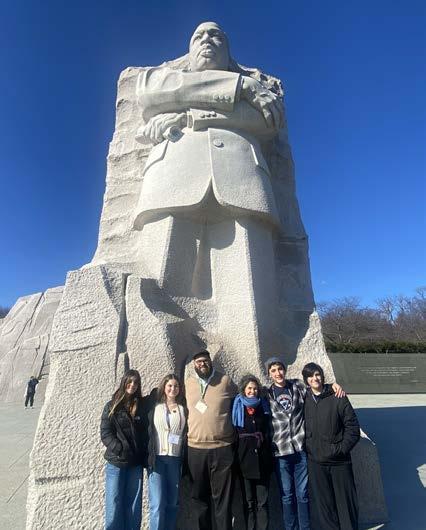
We Are Read in Israel
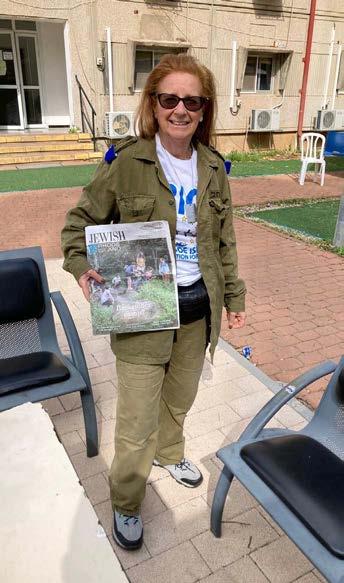
Alyse Teitelbaum, a Rhode Islander and a Rhode Island Coalition for Israel board member, recently volunteered in Israel on a medical supplement base.
BY SARAH GREENLEAF
“Mothers and Other Fictional Characters” (2025 Chronicle Books) by Nicole Graev Lipson is an essay collection that explores the nuance of everyday living and elevates what is often thought of as the mundane into ideas worthy of rigorous thought and consideration: mothering, family bonds, friendships. Through the lens of English literature, these essays tackle parental infidelity, a mother’s relationship to her child’s exploration of gender, the joys of female friendship, the complex feelings that can come with IVF, and the challenges of growing older. All these essays are written with a palpable love for their subjects, no matter how flawed, and a transparency of thinking that is increasingly hard to find.
NICOLE GRAEV LIPSON’S writing has been awarded a Pushcart Prize, has been selected for “The Best American Essays” anthology and has been shortlisted for a National Magazine Award. She holds a BA from Cornell University and an MFA from Emerson College.
She spoke to me for Jewish Rhode Island; our conversation has been edited for length and clarity.
“Mothers and Other Fictional Characters” is such an incredible title. How did you come up with it?
It’s a bit of a play on words –“fictional characters” because on the one hand, I’m trying to illuminate some of the fiction in our real lives as women. But I am also trying to illuminate how fiction, in its willingness to embrace complexity, to look under the surface of things, can feel so real.
Motherhood has been a much-explored (or more-explored) topic in the past few years. What drew you to this topic?
While I have always written for a long time, it was my
secondary occupation. I was teaching English, working in book publishing, and I freelanced, but always on the side. It was really becoming a mother that gave me this sudden longing and desire and resolve to center writing in my life.
I feel like motherhood was a magnifying glass on everything that I cared about and made me feel everything more powerfully and strengthened my urge to communicate about it and do my part to try to make the world a better place. My writing is not a protest sign, it’s not a piece of legislation, but in all my writing, I am trying to do my part, to move the needle ever so slightly on some of the injustices I see in the world and some of the inequities. And it is motherhood fueling that work.
need to do (or what resources do they need to have) to be part of the conversation?
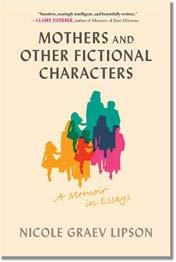
I am really advocating for small shifts to begin with, in the way that we talk about motherhood, in the way that we talk about parenting and in the ways that we acknowledge what our fellow caregivers are doing and really recognizing and valuing the work that it takes. We receive so many unspoken messages that really devalue and denigrate caregiving in our culture, which is maddening when you consider just how important it is.
ture. All mothers know that it’s anything but instinct; it’s a lot of hypothesizing, mistake making, refining our assumptions, testing things out, reflection. It is an intellectual process, and we grow and get better at it the more we do it.
I loved your essay “The Friendship Plot” about your friendship with Sara. Tell me about your decision to include it and what you think it adds to the collection.
In many ways, this collection is about love in all its forms. In every essay I am trying to act from the deepest place of love and put together this sort of collage of the roles we take on in life. I think that female friendship is so formative for girls, and that was a really important piece of the puzzle to get in how our female friendships shape us.
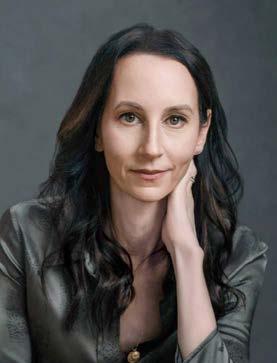
me, and I am trying to write my way through it. What I love about the essay form is that it is a place that allows confusion.
“The artistry and intellectual rigor of mothering are hardly recognized at all.”
What do thinkers who mother
I think it is important to find those opportunities to really spotlight the intellectual rigor of caregiving along with the feeling that goes into caregiving. Because, as I point out in that essay, it’s both, right? It’s not that intellect is more important than feeling, but I do think that there is this, you know, glorification of maternal instinct in our cul-
I also wanted to get that in there because, as I argue in the essay, for so many heterosexual women in committed relationships with men, our female friendships and relationships remain in some ways our most intimate relationships, and female friendship for me, and for a lot of women I know, has been the place where I air everything, where I can be in some ways my truest self. There’s just so much less pressure in a friendship. And I think along with that easing of pressure, there’s more freedom to just be.
What drew you to the essay form? What does it allow that other forms do not?
Every single one of my essays is propelled by love and born from confusion. I sit down to write usually because there’s something that is bewildering me, perplexing me, confusing
I think that there’s so much non-fiction writing, the hot take, the 800-word essay, the opinion pages, where we are expected more and more to have a very clear and firm opinion and to come down on a particular side.
There are some issues currently where there’s so much pressure to come down on a particular side that people can be accused of betrayal of a particular orthodoxy if they are not fully black and white in their thinking, which I think is really dangerous. I think it’s very dangerous to forfeit our nuanced, complicated, contradictory thinking for the sake of activism, however well meaning.
It’s such a humble claim that the essay makes. It’s like, I’m not trying to convert you. I’m just trying to figure out this thing, and I’m inviting you to try along with me. Your piece on IVF and the blastocysts was something I had been searching for
CONTINUED ON PAGE 27

BY STEPHANIE HAGUE
LAST MONTH Jewish communities around the world celebrated Tu B’Shevat, the 15th of the month of Shevat (this year coinciding with Feb. 13 and 14), which is traditionally known as the new year of the trees. In modern times, Tu B’Shevat has been embraced as a day of renewal and celebration for the Jewish environmental movement. In 2022, Adamah launched the Jewish Climate Leadership Coalition, a network that has grown to more than 400 Jewish community organizations
who recognize the existential threat and moral urgency of the climate crisis and commit to take action.
The Jewish Alliance of Greater Rhode Island is proud to begin its third year as a coalition member.
All coalition members, including us, have committed to developing organizational climate action plans that focus on reducing our institutional emissions and mobilizing our broader networks to engage in climate action.
Some highlights from the past three years include moving the Bonnie & Donald Dwares
JCC building to receive our energy from off-site solar, beginning to collect and compost food waste on site, and hosting a native plant sale for our community and neighbors.
We look forward to sharing more of our work with the broader community through a quarterly column in Jewish Rhode Island, which will offer our community tangible and meaningful ways to address climate change.
The strength of Adamah’s Jewish Climate Leadership Coalition comes in part from the collective action of the
entire network! Over the last two years, the Coalition has grown to include over 400 Jewish organizations in North America. Each organization identifies what meaningful action it can take according to its capacity. We draw on educational and financial resources to help further our impact, and as a community we make an actual, measurable difference.
Tu B’Shevat is ultimately a Jewish day of nature accounting, taking stock of the past year and looking toward the future. On this date we
account for our climate action work each year. We note the ways we are working to ensure the future health and abundance of the natural world. What better way to honor the new year of the trees than by sharing our collective Jewish community response to the climate crisis?
To learn more about the coalition visit adamah.org/ coalition.
STEPHANIE HAGUE (shague@ jewishallianceri.org) is the chief strategy officer at the Jewish Alliance of Greater Rhode Island.
BY FRANK PROSNITZ
GRIEF, says Iris Bahr, comes in waves – whether it is over the loss of a loved one, or when a loved one loses their memory. It is in a journey, where emotions drift from laughter to tears, where “guilt is everywhere,” where acceptance is illusive.
Iris Bahr, an accomplished actress and comedian, recently brought her award-winning one-woman show, See You Tomorrow, to the University of Rhode Island. It is the story of her own journey, from when her mother suffered a stroke to
today, when her mother lives with dementia in a nursing home in Israel.
“Her hell slowly became my hell,” she says.
The performance was sponsored by the University of Rhode Island Hillel, the theater department, health services, and Congregation Beth David of Narragansett.
Performing before an intergenerational audience at URI’s Swan Hall Auditorium, Bahr connected with the audience of nearly a hundred, who during a question-and-answer segment following the 55-minute performance, shared their own stories of journeys like
CONTINUED FROM PAGE 26
–philosophical and ethical thinking on this topic are hard to find. What influenced your thinking on this essay? In that essay, I really wanted to explore how I could, on the one hand, be passionately pro-choice and believe with every fiber of my being in a woman’s right to choose what to do with her body, and at the same time, I had all of these kind of like thorny emotional feelings about my unused, frozen embryos which I absolutely do not think of as life. I wish I could just dispose of them like biopsy tissue, but they came to be representative of some sort of potential. I really wanted to be able to capture the both-and-ness of that particular experience in my life.
Bahr’s.
Bahr articulated the emotional journey they had undergone.
She began the story during a video call in February 2022. Bahr was in her Los Angeles apartment and her mother in her apartment in Israel, when her mother suffered a stroke during the call. There were those frantic moments as she tried to find someone to call an ambulance for her mother, her trip to Israel within days of the call, and the extremes of hope that her mother would recover and despair to learn the dementia that resulted would only get worse.
And I really wanted to capture that state of being of two minds. Tell me about how Judaism influences your motherhood.
As I write about in “Tikkun Olam Ted,” there is this idea, sort of fundamental to Judaism, that it’s not our job to fix the world, but it is our job to do our part. And that can mean many things, right? It can mean writing to your elected officials. It can mean picking up trash on the streets. It can mean donating money to the causes that you believe in.
Judaism reminds me that it’s okay to not be perfect but to keep trying and returning to the principles and the values that are at our core. It reminds me of Yom Kippur. I mean, it’s scheduled on the calendar that every year
We learn early on of her frustrations with her mother, a not so unusual mother-daughter relationship that, at times, Bahr says, proves that “suffocation transcends geographic boundaries.” And, of love, of family that “transcends” frustration.
“Love and guilt,” Bahr says, “are very powerful.”
As the play’s promotional material suggests, this is a “funny and poignant story about family, caregiving, guilt, and what happens when memory and one’s history dissolves in an instant.”
It is a conversation between Bahr and her audience, with
we are going to fail. It’s not like, “Oh, are we going to have to do Yom Kippur this year?” It’s coming. We will have to do it.
I do think of caregiving, of mothering, as a type of repair work. We have these humans in our care, and the choices that we make are choices about what changes we want to see in the world. I do think raising children is such a fundamentally optimistic task. You cannot raise children without hope for a better world in some way and without thinking on some level every single day about the lessons that you’re imparting and the ways that you are trying alongside with your children. I think that motherhood calls you to task on that.
As part of The Cardigan Connection,
a minimal set of a small table and a couple of chairs.
See You Tomorrow is one of a number of one-person award-winning shows that Bahr has written, performed, and produced from the United Nations to the United Kingdom.
Bahr, who now lives in New York, is a magna cum laude graduate of Brown University, where she studied Neuropsychology, is stand-up comic, and has appeared in numerous television shows, including Curb Your Enthusiasm (a recurring role), The Connors, and her cable series, Svetlana.
Nicole Graev Lipson will be speaking on Tuesday, March 11, at 6:30 p.m. at Alchemy, 171 Chestnut St., Providence. To register, go to https://www.robinkall.com/events-interviews/the-cardigan-connection-1
She will be in conversation with Rabbi Sarah Mack on Wednesday, March 12, at 9 a.m. at Temple Beth-El for Coffee and Conversation. For more information, https://www.temple-beth-el.org/event/nicole-graev-lipson-book-event.html
SARAH GREENLEAF (sgreenleaf@ jewishallianceri.org) is the digital marketing specialist for the Jewish Alliance of Greater Rhode Island and writes for Jewish Rhode Island.
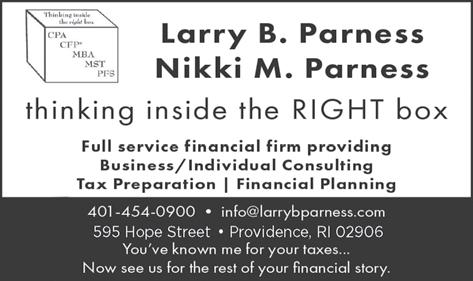





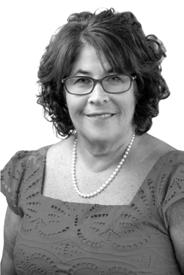













Joan Garfinkel, 79 NARRAGANSETT, R.I. –
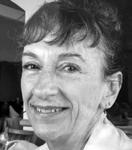
Joan Ellen (Lincourt) Garfinkel, of Narragansett, passed away on Feb. 21, 2025, at HopeHealth Hulitar Hospice Center, Providence. She was the wife of Stephen M. Garfinkel, with whom she shared 57 years of marriage.
Born in Providence, a daughter of the late Leo and Yetta (Blumberg) Lincourt, she had lived in Narragansett for the past 38 years.
A singer and theater actress in her early adult years, Joan was later an award-winning watercolor artist and certified yoga instructor.
In addition to her husband, she is survived by two sons, Todd Garfinkel of Providence and Paul Garfinkel and his spouse, Emily O’Brien, and one grandson, Michael Garfinkel, of Vancouver, British Columbia.
Contributions may be made to Chabad of West Bay Chai Center, 3871 Post Road, Warwick, RI 02886 https:// rabbiwarwick.com/
Lawrence Gates, 90 PALM BEACH, FLA. –
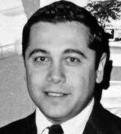
Lawrence Stuart Gates, Esq., of Palm Beach, died at his home on Feb. 10, 2025. He leaves behind his wife of 67 years, Helene. Larry, as he was known to his family and friends, was born and raised in Providence, the son of the late Irving and Rita Gertsacov. He graduated from Moses Brown School, Class of 1952. He attended Tufts University, where he was a proud lifetime member of the Alpha Epsilon Pi fraternity, graduating with a B.A. in Economics as part of the Class of 1956. Larry went on to the Boston University School of Law, earning a Bachelor of Laws Degree LL.B. in 1959 and later a Master of Laws in Taxation in 1962.
Larry served as counsel to the Honorable U.S. Senator John H. Chafee during Chafee’s years as governor of Rhode Island. Later, at Chafee’s insistence, Larry ran for the Rhode Island State Senate as a Republican. He went on to have a distinguished legal career, practicing law for more than 50 years as a member of the Rhode Island
Bar. He began his career in private practice with Zietz, Sonkin & Radin, and then co-founded the law firm of Gates, Mellion, Moore & Berren, where he worked until his retirement. His practice focused on trusts and estates, and he became a trusted advisor to many families and businesses.
Larry also was the managing trustee of D.I. Trust, a real estate investment and development company.
Larry was also an owner and partner in various other businesses, including a number of real estate holding and development companies operating in New England and the Southeast, and a partner in a successful group of nursing homes that operated in New England for over 50 years. Larry spent many years pursuing his love of art. He was a painter and enjoyed working with artists and galleries, serving as an advisor and legal counsel to various artists and art galleries in Palm Beach and New York.
Larry’s lifelong desire to help others included philanthropic work and dedication to causes he cared about. He spent many decades working for Big Brothers of Rhode Island, where he always enjoyed mentoring and helping others to “be their best selves.”
He was also involved with other charitable organizations, including Temple Beth-El, in Providence. Larry was a multi-generational member of Temple Beth-El, and he and his wife, Helene, served as the co-chairs of the Benefactors Fund. Through this initiative, they brought guest speakers to the community to promote education, world affairs and a lifelong love of learning. Notable speakers included Henry Kissinger, Jehan Sadat and Leah Rabin. During his retirement, Larry continued to help others as a math teacher/tutor at the Palm Beach middle school. He loved teaching children and helping them learn to love math, a subject he was always passionate about.
Larry was also an enthusiastic and lifelong golfer. Starting in his youth as the Junior Club Champion for many years at Ledgemont Country Club, he carried this passion throughout his life, playing many courses across the United States and around the world. He enjoyed competition as well as playing for the joy of the game with his wife and friends. He particularly enjoyed his many years
playing at Ledgemont Country Club, Palm Beach Country Club and The President Country Club. In his youth, Larry was also a marksman, teaching riflery at Camp Bauercrest, where he enjoyed being a counselor.
Larry spent his retirement living in Florida, where he continued to be an active real estate investor, traveling with his family and enjoying time with Helene and his children and grandchildren. He also spent his retirement pursuing his lifelong passions: reading, painting, playing bridge, collecting, golf and art.
Larry’s love for his alma mater, Tufts University, was evident in his decades-long involvement with the Tufts Alumni Association; he was a proud Jumbo. As a member of TAAP, Larry conducted countless alumni interviews. He always enjoyed his time talking with prospective students and hearing about their lives and dreams.
Larry was a husband to the love of his life, Helene Pilavin Gates. He was a caring and loyal son to Irving and Rita Gertsacov; a loving brother to the late Charlotte Levine and loyal brother-in-law to the late George Levine; a devoted father to his four children, Eric Daniel Gates and his wife, Amy; Andrew Albert Gates and his wife, Liza; Allison Gates Tierney and her late husband, Michael; and Lisa Gates Bigney and her husband, Michael. He was also the cherished “Grampy,” grandfather to Jason, Adam, Jessie, Oliver, Isabelle and Sophie Gates, Shane, Bennet and Jeremy Tierney, and Anna and Sarah Bigney. Larry was a beloved son-in-law to Albert and Selma Pilavin; a trusted friend, advisor and son-in-law to Selma’s second husband, Murry Robinson; a dedicated brother-in-law to Faye Barbara Pilavin Joslin and her husbands, William Mayer and William Joslin, Jr.; and uncle to Patti Boochever and her husband, Stephen; Marsha Books and her husband, Richard; David Mayer and his wife, Charisse; and Ellen Mayer. He was also a loving cousin and great uncle to many.
Green, 91
PAWTUCKET, R.I. – Paulette B. (Breyer) Green, of Pawtucket, passed away on Feb. 11, 2025, at St.
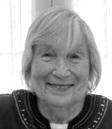
Elizabeth Home. She was the loving wife of the late Herbert “Harvey” Green. Born in Baltimore, Maryland, she was the daughter of the late Maurice B. and Anna R. (Rosenthal) Breyer. Mrs. Green was a registered nurse at The Miriam Hospital, in Providence, for many years before retiring. She was a volunteer usher for the Providence Performing Arts Center and a docent at Roger Williams Park Zoo. She is survived by three children, Steven Green and
his wife, Margo, of Williston, Vermont; Jeffrey Green and his wife, Karen, of Providence; and Nancy Doran, of Redmond, Oregon; and several nieces and nephews. She was the sister of the late Sara Altoff and mother-in-law of the late David Doran. Contributions may be made to Roger Williams Park Zoo,1000 Elmwood Ave., Providence, RI 02907 or to BrightFocus Foundation, 22512 Gateway Center Drive, Clarksburg, MD 20871.

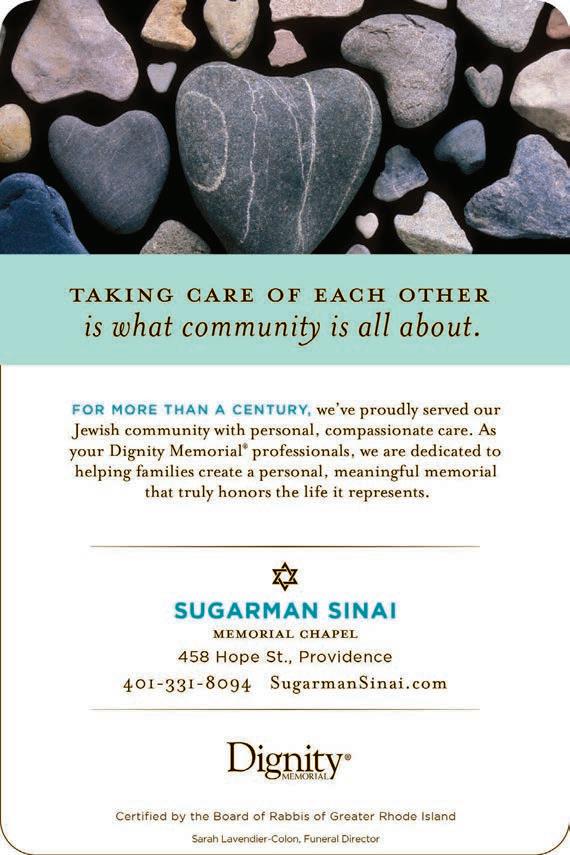
Alan Klitzner, 83 CUMBERLAND, R.I. –
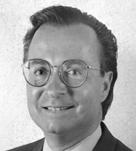
Alan Joel Klitzner, of Cumberland, passed away on Feb. 22, 2025, at his residence surrounded by his loving family. He was the husband of Leta (Logowitz) Klitzner, with whom he would have celebrated 63 years of marriage in May.
Born in Providence, he was the son of the late William and Tillie (Weinberg) Klitzner, father of the late Jeffrey Adam Klitzner and brother of the late Rhoda and Carl Klitzner.
A graduate of Bryant College, Mr. Klitzner was the owner of the jewelry manufacturing company Klitzner Industries Inc. for many years before retiring. He was an avid golfer and a longtime member of Kirkbrae Country Club.
In addition to his wife, Leta, he is survived by two children, Dean Jason Klitzner and his wife, Jill; and Heidi Ellen Solomon and her husband, Joel; 10 grandchildren; a sister, Dayle Kellner, her husband, John, and their two children; a sister-in-law, Penny Prickett, her daughter, Lori Prickett, her wife, Daniella and their two children.
Contributions can be made to the American Heart Association,1 State St., Suite 200, Providence, RI 02908.
Edward Grossman, 85 NARRAGANSETT, R.I. –Edward I. Grossman passed away on Feb. 21, 2025, at South Kingstown Nursing and Rehab. He was the beloved husband of Ann (Myerson) Grossman for 59 years. Born in Cranston, he was a son of the late Morton and Ruth (Abedon) Grossman. Raised in the East Side of Providence, he was a graduate of the New York Military Academy in Hudson, New York in ’57. He had lived in Narragansett for the last 22 years, previously he was living on the East side of Providence.
A bachelor and master’s of Agriculture recipient, he graduated from the University of Rhode Island and was a member of Alpha Epsilon Pi and later became a Free Mason. He was the vice president of Crawford Garden Supplies. After the business closed, he joined Arett Sales until he retired.
He was the devoted father of Bruce, his wife, Cara Grossman, of Birmingham, Alabama; Lisa, her husband, Donald Headley, of Russellville, Alabama; and Susan Grossman of Vancouver, British Columbia, Canada. He was the dear brother of Harriett Miller.
Contributions may be made to Congregation Beth David, PO Box 3299, Narragansett, RI 02882 or the Narragansett High School; Dept of Agriscience, Future Farmers of America, 245 South Pier

Road, Narragansett, RI 02882.
Barry Levin, 89 CRANSTON, R.I. – Barry E. Levin passed away on Feb. 25, 2025, at Brookdale Sakonnet Bay in Tiverton. He was the beloved husband of Frances (Brotman) Gersten Levin for 55 years. Born in Bronx, New York, a son of the late Louis and Frances (Brown) Levin, he had lived in Cranston for 54 years, previously living in Pawtucket.
He was a fourth-grade teacher at the former Valentine Almy Elementary School for more than 30 years, retiring in 2000. Following his retirement from teaching, he continued serving at the former Lincoln Downs in Lincoln as a ticket clerk. Barry was a devoted “car guy.” He poured his spare time into his blue 1941 Plymouth Special Deluxe Business Coupe, a car he had owned since the mid-eighties, that he proudly showed off on Sundays and for shows dedicated to classic cars. He also played the 1923 saxophone, given to him by his father, with the Providence Civic Orchestra of Senior Citizens. Barry, a passionate guy with a kind, gentle demeanor, was a dad to Gary, his wife, Robin Gersten, and Carl Gersten all of Plymouth, Massachusetts; and Lori, her husband. Michael Shore, of South Kingstown. He was the loving grandfather of Bethany, her husband, Nick; Erica, her husband, Joseph; Kayla, her husband, Paul; and Brandon, his wife, Eleanor. He was the cherished great-grandfather of three.
Contributions may be made to St. Jude’s Children’s Hospital, 501 St. Jude Place, Memphis, TN 38105.
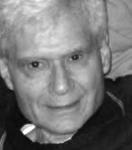
– Howard “Howy” Levy died at his home on Feb. 6, 2025. Son of Ida (Lipsky) and Louis Levy, Howy was born on May 15, 1934, in Providence, where he spent his childhood. After graduating from Classical High School, he attended URI graduating in 1958 with a degree in Electrical Engineering. That summer, he married the love of his life, Lois Weinbaum, and they remained happily married for 39 years. He would frequently say he married the right girl the first time. They bought
their first home in Peabody, Massachusetts, near Boston, where he started what would ultimately be a 40-year career as a government employee at the Boston Naval Shipyard. In 1973, when the shipyard closed, he moved his family to Lewiston, Maine, so he could continue his engineering work at Bath Iron Works.
Howy was listed under “H” in many of his family’s and friends’ contact lists, but the “H” was for “Handyman.”
Nothing excited him more than a “fix-it” challenge. His interests included, in no particular order, Big Band music, playing the trumpet, cars, photography and any home project. He was also a word enthusiast, loving the challenge of a good puzzle.
Howy was predeceased by his parents; his wife, Lois (Weinbaum) Levy; and his brother, Stanley Levy. His memory lives on with his three children, Jill (Levy) DesLauriers and her husband, Barry, of Hudson, New Hampshire; Karen (Levy) Douty and her husband, Kurt, of Framingham, Massachusetts; and Jeff Levy and his wife, Adrianne, of Saco, Maine. He was very proud of each of his six grandchildren, Alex DesLauriers; Shaina Douty; Leah Douty and her partner, Cayla Stangel; Chad Douty; Tara Levy and Ethan Levy. They are remembering their “Papa” as a source of guidance and wisdom, always there with words of encouragement as well as advice (solicited or not) and forever and always their biggest cheerleader. He will be deeply missed by his brother, Barry Levy, of Delray Beach, Florida, and his many nieces and nephews.
Roy Pansey,
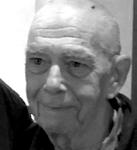
FLORIDA – Roy Harrison Pansey, of Florida, died unexpectedly on Feb. 24, 2025. Born in Providence, he was the son of the late Neil Pansey and the late Florence Murphy. He was the brother of Gary Pansey and the late Bruce Pansey.
A former Pawtucket resident, Roy graduated from the Moses Brown School and Georgia Tech with high honors. He went into the family textile business, Pansy Weaving Mills in Pawtucket. When they closed the doors on the textile business, Roy, who was a member of the RI Air National Guard, decided to
join the Air Force full time. He was promoted to colonel in 1995. He then worked at the Pentagon as a liaison between the joint chiefs of staff and the President of the United States. When he finally retired to the Tampa area he became a civilian employee of the MacDill Airforce Base. He is survived by his son, Steven B. Pansey (Jennifer) of Scituate, Massachusetts. In lieu of flowers please donate to a charity of your choice.

BOYNTON BEACH, FLA. – Samuel W. Perelman died on Feb. 8, 2025, in Boynton Beach. He was the beloved husband of Donna (Cort) Perelman for 66 years. Born in Providence, he was a son of the late Charles and Eva (Kurzman) Perelman. He had lived in both Boynton Beach, Florida, and Narragansett. He was the President of the former Carol Cable Company, retiring in 1991. Samuel was an Army National Guard reserve member. Samuel was a bachelor’s degree recipient from the University of Rhode Island.
He was the devoted father of Todd Perelman and his wife, Lisa, of South Kingstown; and Keith Perelman and his wife, Pam, of Wakefield. He was the loving grandfather of Jason and Renee. He was the cherished great-grandfather of Adelina, Carson, William, Madelyn and Lily. He was the dear brother of the late Carl Perelman.
Contributions may be made to Camp JORI, P.O. Box 5299, Wakefield, RI 02880; campjori. com/donate.
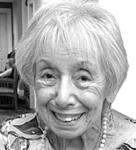
CAPE COD, MASS. – Frances M. Sapers passed away on Feb. 17, 2025, at Kent Hospital. She was the wife of the late Merton M. Sapers for 72 years. Born in Boston, Massachusetts, a daughter of the late Louis and Dorothy (Wolper) Wax, she was a lifelong resident of Massachusetts and most recently resided in Rhode Island.
She was the devoted mother of Mark W. Sapers and his wife, Joanne, of Merrimack, New Hampshire; Ronda L.
Smith and her husband, Robert, of Boca Raton, Florida and Warren; Joanne D. Sapers and her husband, Dave Parmentier, of Warwick; and Karen B. Rozell and her husband, Ralph, of Sandwich, Massachusetts. She was the dear sister of the late Melvin S. Wax, Estelle Saphirstein and Shirley Baron.
She was the loving grandmother of Julianne (Greg), Andrew (Jessica), Alisa (Kevin), Brianna (Brian) and David. She was the cherished great-grandmother of Ava, Sadie, Benny, Charlie and Lilly. She was the adored aunt of Jimmy, Peter (Diana), David (Lisa), Donna (Bruce), Amy (Josh), Caryl (Steve) and the late Ruth Saphirstein.
Fran was truly the matriarch of the family and was lovingly respected and adored. A proud and classy lady, always dressed to the nines, she would be seen taking her morning and afternoon walks daily, always greeting people with a smile and asking how they were. It was always a priority for Fran to see and know what was going on in the lives of her children, grandchildren, great-grandchildren, nieces and nephews. She was an inspiration to all who knew her. Her passions included current events, history, bridge, reading and her beloved Red Sox and Patriots.
For many years, Fran worked as an insurance administrator, broker and sold long-term care insurance. She was a former member of Falmouth Jewish Congregation and a past board member of its Sisterhood.
To understand the depth of love that Fran experienced in her life is to know about her 72-year marriage with her devoted husband, Mert, who carried Fran’s picture in his wallet every day of his life.
Contributions may be made to the Daniel Schuster Memorial Endowment Fund, c/o Camp JORI, P.O. Box 5299, Wakefield, RI 02879 or Aid to Cancer Research, P.O Box 376, Newton Center, MA 02459.
Robert Yaffe, 70 PROVIDENCE, R.I. – Robert Yaffe, of Providence, passed away on Feb. 12, 2025, at The Miriam Hospital after a brief illness.

Born in Miami, Florida, he was the son of the late Bertram and Erna (Jaffe) Yaffe. His early life was spent in and around Fall River and Dartmouth, Massachusetts, eventually graduating from the University of Massachusetts Dartmouth in 1977. He later settled in the Providence area, becoming a local entrepreneur and beloved fixture in the community.
He opened the Garden Grille restaurant in 1996, the Wildflour Cafe and Bakery in 2010 (both in Pawtucket) and The Grange restaurant, in Providence, in 2013. Prior to that, he operated The Golden Sheaf, his family’s natural foods market, in Providence. His lifelong passion for healthy eating and building community were the guiding principles behind his restaurants, which to this day are vibrant and vital local institutions.
Robert was a creative soul, whose other passions included writing and playing one of his many guitars.
He is survived by his daughter, Alyson Yaffe and her husband, Jesse Kalb; his grandchildren, Bleecker and Declan Kalb, all of Providence; Uschi Yaffe, of Munich, Germany, with whom he shared a meaningful chapter of his life; his sister, Cheryl Kiser and her husband, David, of Weston, Massachusetts; his brother, Eric Yaffe, of Cranston; nephew, Ross Kiser, of Denver, Colorado; niece, Kenna Kiser, of Boston, Massachusetts; and his beloved dog, Fred.
Contributions to Southside Community Land Trust, the RI Food Bank or Berkshire South Regional Community Center are appreciated.
Judge Bruce Selya, 90 PROVIDENCE,
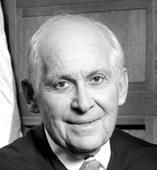
Bruce M. Selya, of Providence and West Harwich, Massachusetts, passed away on Feb. 22, 2025, after a brief illness. He was the husband of Cynthia M. Selya, with whom he shared 24 years of marriage.
Judge Selya was among the longest serving federal appellate judges in the nation and is the author of more than 1,800 published opinions, a body of work that substantially exceeds that of any other judge who has served on the First Circuit Court of Appeals.
Judge Selya was also the longest serving federal judge in Rhode Island history and the only person of the Jewish faith ever to be appointed to the federal bench from Rhode Island.
Judge Selya was born in Providence, the son of the late Herman and Betty Selya, both of Providence. He was educated in the Providence public schools, graduating from Classical High School in 1951. He earned a scholarship to attend Harvard College and graduated in 1955. He received a bachelor's degree magna cum laude and was named a John Harvard Scholar. He next matriculated at Harvard Law School, receiving a juris doctor degree cum laude in 1958. Judge Selya was always quick to point out that throughout his seven years in Cambridge he worked 35 hours a week at a local haberdashery in addition to carrying out his academic responsibilities.
Following his graduation from law school, Selya returned to Providence and served for two years as a law clerk for Chief Judge Edward W. Day in the United States District Court for the District of Rhode Island.
Selya passed the District of Columbia bar shortly after his graduation from Harvard Law School. He passed the Rhode Island bar in 1960 and after completing his clerkship joined the Providence law firm of Gunning & LaFazia (later renamed Gunning, LaFazia, Gnys and Selya). In 1972, Selya founded the firm of Selya & Iannuccillo (later renamed Selya, Iannuccillo & Greenwald), where he practiced for the next 10 years.
In 1982, President Ronald Reagan nominated him to serve as a United States District Judge for the District of
Rhode Island. He was confirmed by the United States Senate and took the oath of office on Oct. 12, 1982, and he served in that capacity for the next four years. He presided over many significant cases and was particularly noted for his rulings in connection with gender discrimination.
In the fall of 1986, Judge Selya was nominated by President Reagan to fill a newly created seat on the United States Court of Appeals for the First Circuit. He was confirmed by voice vote of the United States Senate approximately two weeks later. For the last 20 years of his career, Judge Selya worked with a severe visual disability and became legally blind several years before his death.
Judge Selya has also been a force in ensuring the quality and stature of the Rhode Island bar. A member of the Rhode Island Bar Association since 1960, he was the founding chairman of the Rhode Island State-Federal Judicial Council, and he continued to serve in that capacity.
Throughout his judicial career, Judge Selya displayed a keen interest in legal education. He held faculty appointments at Boston College Law School, Boston University School of Law, and Roger Williams University School of Law and taught courses at all three institutions. In addition, he lectured at law schools across the country.
Judge Selya's was equally well known for his involvement in the wider community. He served as chairman of the board of trustees at Bryant University from 1984 – 1991 and led Bryant's transition from a business college to a full-scale university. He also joined the board of trustees at Rhode Island Hospital and in 1994 became the founding chairman of the Lifespan Health Care System (now Brown University Health). He was also instrumental in the creation of governance mechanisms for Roger Williams School of Law and served at various times, as both board chairman and vice-chairman. Judge Selya was also a longtime member of the board of the Jewish Federation of Rhode Island and was the founding chairman of the Jewish Community Relations Council.
Judge Selya has been awarded honorary Doctor of Laws degrees by Bryant University (1996) and Roger Williams University School of Law
(2001). In 2009, Salve Regina University awarded him an honorary doctoral degree in Humane Letters. In 1988, Brandeis University presented Judge Selya with the Louis Dembitz Brandeis Medal for Distinguished Legal Service. In 1992, he was the recipient of the Neil J. Houston, Jr. Criminal Justice Award (presented by Justice Assistance). In 1998, the Jewish National Fund honored him with its Tree of Life Award for outstanding public service. In 2002, the Hospital Association of Rhode Island presented Judge Selya with the Benjamin R. Sturges Distinguished Service Award for his work in health care. In 2006, Judge Selya was inducted into the Rhode Island Heritage Hall of Fame. In the same year, the Rhode Island Trial Lawyers Association honored him with its "Citizen of the Year" award.
Judge Selya and his wife, Cindy, always had particular pride in their sponsorship of the Judge Bruce M. Selya and Cynthia M. Selya Special Integrated Care Unit, familiarly known, as "Selya Six," a joint venture of Hasbro Children's Hospital and Bradley Hospital, which has received national recognition for its unique care protocols. They are also the sponsors of The Judge Bruce M. and Cynthia M. Selya Employee Wellness Center at the Miriam Hospital. Judge Selya was a member of Temple Beth-El in Providence as well as many other civic organizations.
In addition to his wife, Cindy, he is survived by two daughters, Dawn Selya, and Lori Ann Young and her husband, Daniel Patrick Young, Sr., of Dedham, Massachusetts; six grandchildren: Bradford Parker Sherman, Samantha Lynn Hochstetler and her husband, Nathan Cole Hochstetler, Paige Emerson Young, Daniel Patrick Young, Jr., William Colby Young, and Thomas Preston Young; two great-granddaughters, Elliana James Hochstetler and Adalynn Baker Hochstetler. Judge Selya is also survived by his sister, Susan Jane Rosen and her husband, David of Boston, Massachusetts, and their son, Joel Arthur Rosen.
Contributions may be made to the Selya Medical Pediatric Psychiatric Endowment (Hasbro) c/o Ms. Michele P. Branigan, Sr. Philanthropy Officer & Campaign Manager, Hasbro Children’s Hospital, P.O. Box H, Providence RI 02901. For complete obituary, go to jewishrhody.com.
